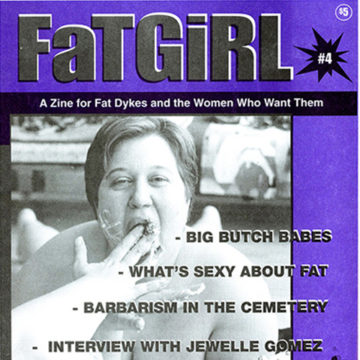[image description: A book cover with a pink background. “Vol. 1: ZINES!” in large black text across the top. A large photo of a thin white person with burgundy short hair, red lipstick and a leopard-print coat. In one hand they hold up a fanned-out handful of different issues of a 1950’s-looking pink zine entitled “Mystery Date,” which partially obscures their face. An aqua curtain is behind them, against which is a white speech bubble with black text: “Surrender to the incredibly strange urge… to create your own zine!” In the bottom right corner is the RE/Search lettering, underneath which it says “From V. Vale, former co-publisher of RE/Search” ]
Title (as given to the record by the creator): Fat Girl (Chapter from “Zines! Vol. 1”)
Date(s) of creation: June, 1996
Creator / author / publisher: V/Search, V. Vale
Physical description: 20-page chapter from a book
Reference #: Zines!-VVale-FatGirl
Source: Max Airborne
Tags: 1990s, collectives, FaT GiRL, interviews, V Vale, zines
Links: [ Book ] [ PDF of this chapter ] [ FaT GiRL Archive ]
Fat Girl interview from “Zines! Vol. 1”
Editor’s note:
This is an interview with members of the collective that produced the zine FaT GiRL. It appeared in the book Zines! Vol. 1, by V. Vale of V/Search (formerly Re/Search) publications. See more from FaT GiRL in the FaT GiRL Archive. You can get the book Zines! Vol. 1 from researchpubs.com
View as PDF:
Transcribed text with image descriptions:
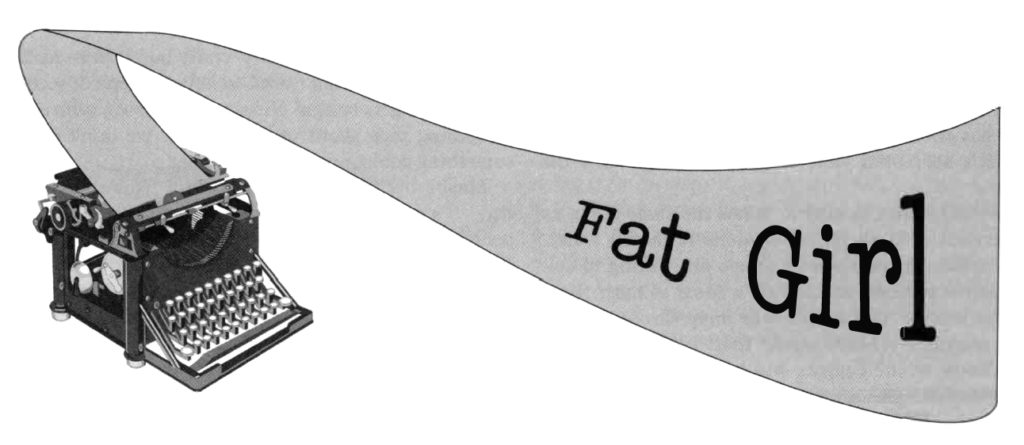
Fat Girl, a magazine “for fat dykes and the women who want them,” is published by the Fat Girl Collective (sample issue $5; $20 for four issues from 2215-R Market St #197, San Francisco CA 94114; 415-XXX-XXXX). Besides publishing a paper zine, they have a web site: https://www.fatgirl.com/. Founding member Max Airborne also runs a private subscriber-only e-mail discussion list for fat dykes: airborne@sirius.com. Ten members of the collective (April Miller, Barbarism, Bertha Pearl, Candida Albicans Royale, Laura J., Pandoura, Judy, Margo Mercedes Rivera, Max Airborne and Sondra Solo) were interviewed by V. Vale at April’s home in the East Bay.
♦ VALE: How can you keep a collective enterprise going over the long haul?
♦ BARB: It’s hard, because we live in a very competitive, individualistic society. In the very act of getting people together to try to change things, you’re involved in a creative process, and being involved in a creative process with multiple people is always a challenge! [laughs]
♦ BERTHA: We want to do something creative while we’re being passive consumers! Or: “Buy our magazine and then go out and do something radical!”
♦ APRIL: She does the advertising for our magazine.
♦ V: I’ve read that even though the number of publications is increasing, the available pool of readers is shrinking almost daily—
♦ BERTHA: That’s amazing. I read all the time—cereal boxes, whatever’s nearby!
♦ MAX: These days, with television and radio everywhere, it’s too easy not to read.
♦ BERTHA: Bodily Fluids was so interesting that I couldn’t put it down. It’s my bathroom reading—
♦ MAX: “I’m shitting, so I may as well read about it!”
♦ BARB: I’m wondering if people are reading less because what’s available to them just isn’t interesting. The thing about the “Zine Revolution” that’s exciting is—now there are really interesting publications out there to read, you just have to make the effort to find them. When you find one, it’s like finding a treasure because a lot of what’s being published is boring—it’s all about making money. It’s not expanding your mind or communicating; it’s not interactive. It seems that zines are a response to this vacuum.
♦ CANDIDA: Unfortunately, it’s still hard to find good zines that you can really be into—
♦ BERTHA: Usually you go, “Not my tribe, not my tribe … ah, here’s one!” When I go to a mainstream magazine stand, I can look through scores of women’s magazines and they’re all about quick “lite” meals you can make in three minutes!
♦ APRIL: She does our “Kitchen Slut” column, which includes guilt-free recipes—
♦ MAX: I can look through hundreds and hundreds of magazines and be lucky to find one that’s worthwhile.
♦ V: Your magazine is unusual in that it’s produced in the spirit of a collective enterprise, rather than by a hierarchy or a lone individual. Whose idea was this? [everyone looks at Max, and laughs]
♦ MAX: I insisted. Actually, there were three or four of us, and we thought, “We need more people, and it should be a collective!” At first the others were like, “Oh, come on!” But I kept saying, “Yes, yes!” Since then I discovered that I really have a hard time being in a collective, because I’m kind of a workaholic, and I get resentful when other people aren’t! I have since left the collective, as have a couple others of us here.
♦ V: But you’re here.
♦ MAX: Yeah, I’m still part of the family—
♦ BERTHA: It’s a collective family—oh yes, we have a secret handshake. To join you have to get your head shaved, turn over all your income and undergo our reeducation program! [laughs]
♦ V: So tell me about the aims of Fat Girl—
♦ BARB: Actually, we wanted to do a publication that was political, funny, and perverse, and it seemed that the way to do that was to have different people be a part of that process. We made a list of all the fat dykes we’d seen around town that we wanted to meet, and began to approach them. To walk up to another fat woman and say, “Hi! We’re doing a zine for fat dykes—would you like to be part of it?” and to see their emotional response when someone is talking to them openly about being fat (whether or not they felt comfortable with that)—well, this was an intense process!
♦ BERTHA: We’re continuing to work in a collective environment. As hard as it is, it gives you a diversity of voices, there’s a lot of different input, and besides, it feels good!
♦ MAX: The idea that created the collective was: we wanted to do a zine for fat dykes. And the fact that it’s a collective is why it’s still around. If it were just me and my little friends—or big friends, as it were—the commitment to keeping a zine for fat dykes going wouldn’t necessarily be there.
We change and grow (personally, I want to do some new things; I don’t necessarily want to spend all my energy working on something just for fat dykes, because I think about other things, too). But it’s important that Fat Girl stay in existence, because it has brought together fat dykes from all different walks of life, to talk about issues in ways that haven’t been done before. It’s become almost an institution for some people—
♦ BERTHA: And the visibility is important—fat women are rarely visible in media. This is one of the few places where fat dykes are out—in the open.
♦ BARB: It took us six months to produce the first magazine, and we spent a lot of that time talking. One of our first endeavors was to put together an “issue statement,” so that we had a clear idea of what we wanted to present. We discovered how diverse our interests were, what our heartfelt hopes were, and because we spent a lot of time doing this we were able to incorporate a lot of diversity into our publication: sexuality, smut, and sincere writing about being a fat dyke growing up in this culture and being alienated … talking about hard things as well as fun things. We spent a lot of time laying the groundwork, making sure we were inclusive about all of this.
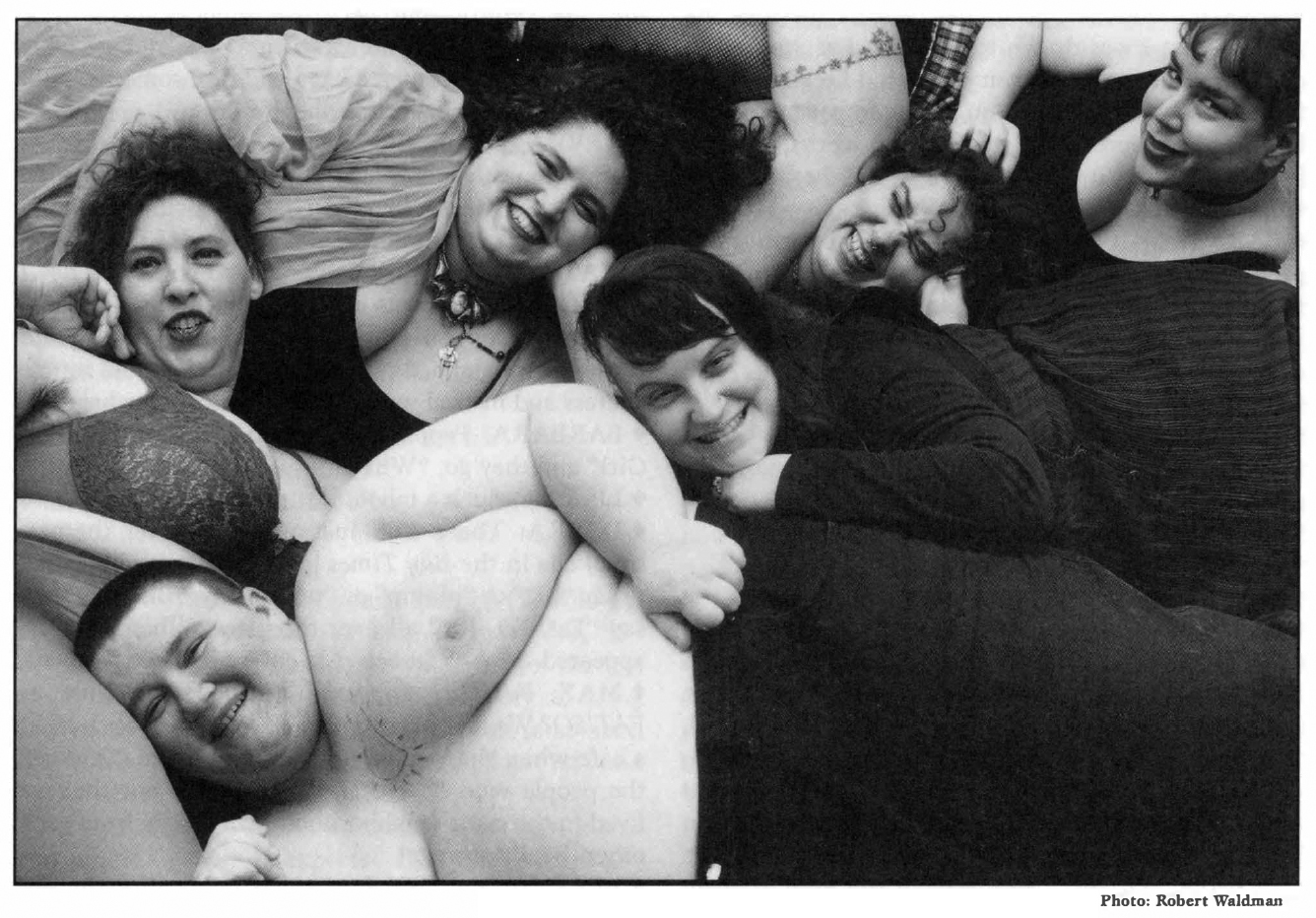
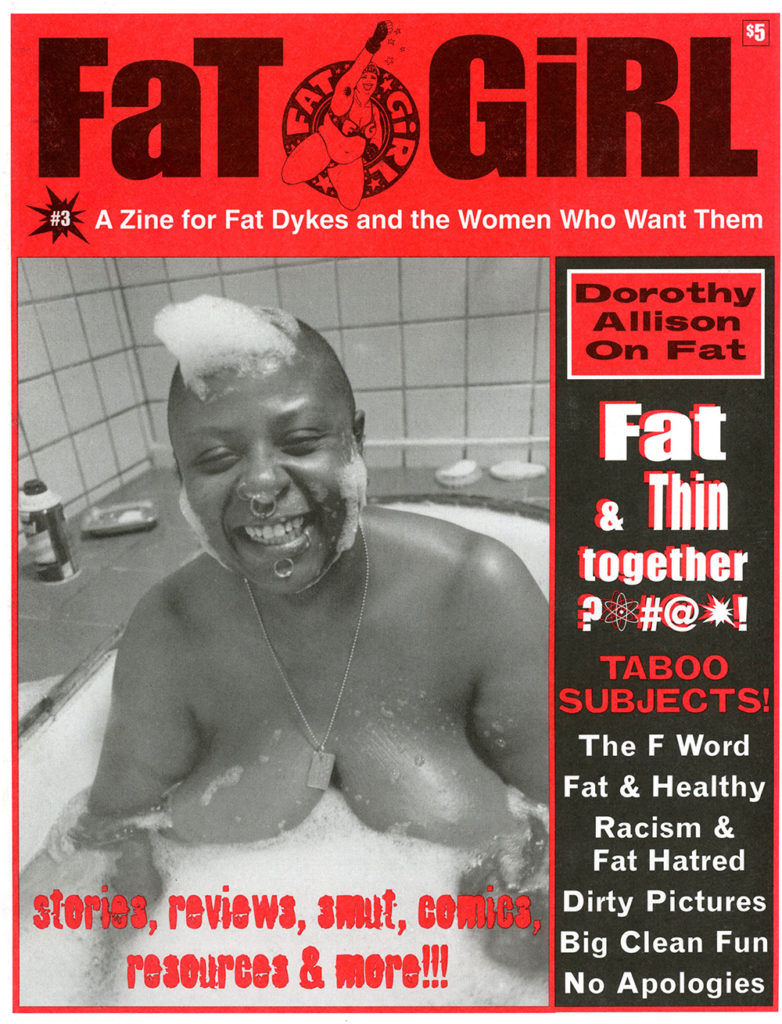
♦ APRIL: It’s the combination of all of our experiences (different from each other, and the same) that creates the richness of the zine.
♦ MARGO: This is one of the reasons (besides the content) that I was drawn to Fat Girl. I’ve worked in collectives for the past seven years, and I really believe in the collective process. You really do get to see different voices represented, and when it works, it’s really great! (When it doesn’t work, it can be horrible.) Hopefully, this is a functional collective.
♦ BARB: It has to happen by honoring this process; it’s a two-way thing. Personal issues came out that have never been expressed before—it was so intense. Even something basic like “What’s fat?” aroused controversy—
♦ BERTHA: “You’re not fat enough to be in Fat Girl!”
♦ BARB: It attracted people who really needed a support group, and support in general— like most people need.
♦ V: Your magazine is very slick—
♦ BERTHA: We’re perfectionists!
♦ MAX: It’s a labor of love—anal love!
♦ BARB: We sat down and learned how to do desktop publishing, deal with printers—how to make it happen. We went to people we knew in the dyke community who had done publications and asked, “How did you do it? What was your process? What do we need to know? What mistakes should we not make?” From Fish of Brat Attack we got a distribution list. Networking gave us the skills we needed. People were patient with us: “This is what you need to say to the printer. This is what you need to look for. This is what you do.” The fact that we’re able to publish is amazing, considering we didn’t know how to do any of this before. Several of us took a QuarkXpress class to learn how to do layout.
♦ V: How did you pay for the first issue?
♦ MAX: With my credit card! [laughs] And I have been paid back for every single issue.
♦ BERTHA: We also have some advertising, which we view as a resource for our readers. We were approached by smut advertisers with ads which weren’t pertinent to fat dykes, and it felt good to tell them, “We don’t want your money!” Other gay and lesbian publications tend to go for corporate advertising, and this affects their content, because they start pandering to the Budweiser ad on the back cover. But we only wanted advertisers that supported us, that are us, that liked us, that loved us. Our magazine is too precious to waste!
♦ BARB: Being political about the zine means that we also publish a lot of smut that is “borderline”—that potentially plays with pornography laws. But we have been very conscious about all this being within a political context.
♦ V: How do you decide what to print?
♦ BARB: We decided that if we thought something was hot, then despite the pornography laws we would go ahead and publish it anyway. There are a lot of zines out there that are political, there are zines that talk about people’s personal issues, and there are zines that are smutty—but very few combine all of this. Whereas in Fat Girl you can turn a page and see a big fat cunt there, and turn a page and find someone talking about a political action they’ve done.
♦ CANDIDA: I think the fact that our sexuality is just there—honestly—is “political.” We present just honest portrayals. After doing Fat Girl for awhile, I would forget how confrontational it is to people.
♦ MAX: We’ve had our mail tampered with. One day I sent out UPS shipments to 10 different stores and none of them got their zines—that driver had a lot of Fat Girls! So we stopped putting “Fat Girl” on the return address and instead wrote “Mary Smith.” [laughs]
♦ BARB: People are very curious. They see “Fat Girl” and they go, “What?!”
♦ PAN: It’s such a taboo, just to say the word “fat”—
♦ CANDIDA: That’s true. Just on a local level, the personal ads in the Bay Times [gay/lesbian weekly] used to say “big” or “plump” or “not skinny.” But now they say “Fat, Fat, Fat” all over the place. When Fat Girl appeared, a lot of fat activists got a breath of fresh air.
♦ MAX: Fat Girl appeared at the same time as FAT!SO? We met Marilyn Wann [editor/publisher] at a cafe when she walked up to us and asked, “Are you the people who do Fat Girl?” It turned out that we lived in the same neighborhood, two blocks from each other. Really strange!
♦ BERTHA: FAT!SO? is a small publication for fat people across the board—not just for us.
♦ BARB: Fat activism has been going on since the ’70s, but there has been a renewal of interest because there’s so much stepped-up anti-fat activity going on, everywhere you turn. For example, the White House has been participating in “The War On Fat” with Jenny Craig. Recently I read that participation in diet centers has sharply declined—the diet industry is losing a lot of money because people are starting to Wake Up and Drop Out . .. re-examining the Diet Myth, and resisting all the advertising and labeling about everything being “low fat” and “no fat”—
♦ BERTHA: All these “low fat” foods are loaded with chemicals that are all bad for your body—
♦ MAX: —like Nutrasweet.
♦ BERTHA: While they’re telling you to make your body look “better” (according to their views), they’re putting shit in their products that’s going to kill you … faster!
♦ V: You mentioned the Diet Myth—
♦ APRIL: The myth being that if you diet, you’ll get thin. I read that 92.8% of people who diet gain all the weight back within two years, plus more weight. So if you engage in the cycle that you diet/gain it back, then diet/gain it back, you’ll get progressively heavier. Now it’s named as a syndrome: weight-loss yo-yo-ing.
However, the whole Diet Myth has more parts to it than that. It’s not just: “If you diet, you’ll lose weight” (which is by and large untrue). It’s also: “If you are thin, life will be perfect!”
♦ BERTHA: “You will be beautiful!”
♦ BARB: “Everybody will like you, and nothing will go wrong.”
♦ BERTHA: “You’ll have a better sex life!”
♦ APRIL: “You’ll be wealthier!”
♦ MAX: “Healthy, wealthy, wise—and thin!”
♦ BARB: And every single piece of that is untrue.
♦ PANDOURA: I work with very young kids (8-11) who are choking on this American Dream. They tell me, “If I don’t eat that candy bar and just eat apples for the rest of my life, I’ll stay thin enough.” And they’re as big around as my little finger! As long as I can remember, the words “thin” and “beautiful” (as well as “fat” and “ugly”) have always been connected.
♦ CANDIDA: As a woman, no matter what age or size you are, it’s generally expected that you’re dieting—very strange. There are office pools around diets—
♦ BERTHA: My friend’s company has a holiday incentive: if you don’t gain weight over Christmas vacation, you get a bonus! [laughs]
♦ SONDRA: And that’s really common. There’s a myth that you’ll be wealthier if you’re thin, but that isn’t really a myth. There is so much discrimination against fat people; there are so many more costs associated with being fat—like clothing, traveling—
♦ BERTHA: And there’s job discrimination.
♦ BARB: Fat is definitely a class; it pushes you into a different class. (There’s a good book on this: Lesbians Come Out of the Class Closet.) If women are busy thinking about dieting, this crowds out discussions about the real misogynist, racist events going on around them. A lot is going on in Congress this year, and there’s very little coverage in the press—but there sure is a lot of discussion about obesity in this country.
♦ MAX: A woman at work told me that she couldn’t quit smoking, because when she tried to quit, she gained weight. I asked, “You would rather get lung cancer than weigh more?” She said, “Oh yes!” She went on and on trying to justify her position. I said, “Look. I realize that fat hatred is very prevalent in our culture,” and she protested, “Oh no—it’s not fat hatred! Look at my frame!” She just never got it.
♦ CANDIDA: There was a survey in Esquire where all these kids said they would much rather be hit by a truck than be 50 pounds overweight!
♦ SONDRA: And wasn’t there another survey where people said they would rather die of cancer than be fat?
♦ LAURA: There’s another one where people said they would rather abort fetuses if they knew ahead of time they’d be fat!
♦ BERTHA: And people think we’re just whining—
♦ MAX: What a world!
♦ CANDIDA: It’s amazing what levels people will descend to, to justify fat hatred. People think that if you are fat, you are lazy—no matter what. It’s excruciating how deep this goes.
♦ BARB: This discussion typifies the dialogue that’s been aired in Fat Girl, where everything we publish is by and for fat dykes. But many people outside the fat dyke community have found something in Fat Girl that they have not found anywhere else in this world, and have approached us about how Fat Girl has changed how they look at the world, how they write, how they feel about themselves and what they do. The pervasiveness of self-hatred in our relationship with our bodies is so endemic, that when people see us work through this for ourselves, something shifts within them. By focusing on what we feel, what we’re experiencing and where our anger is, we allow other people to re-examine personal issues about their own bodies in a similar light.
♦ BERTHA: The feedback in letters feels really good. All these women have written to us about looking at themselves in a different way: “Now I’ve done this, and I’ve done that, and thank you so much for being there!”
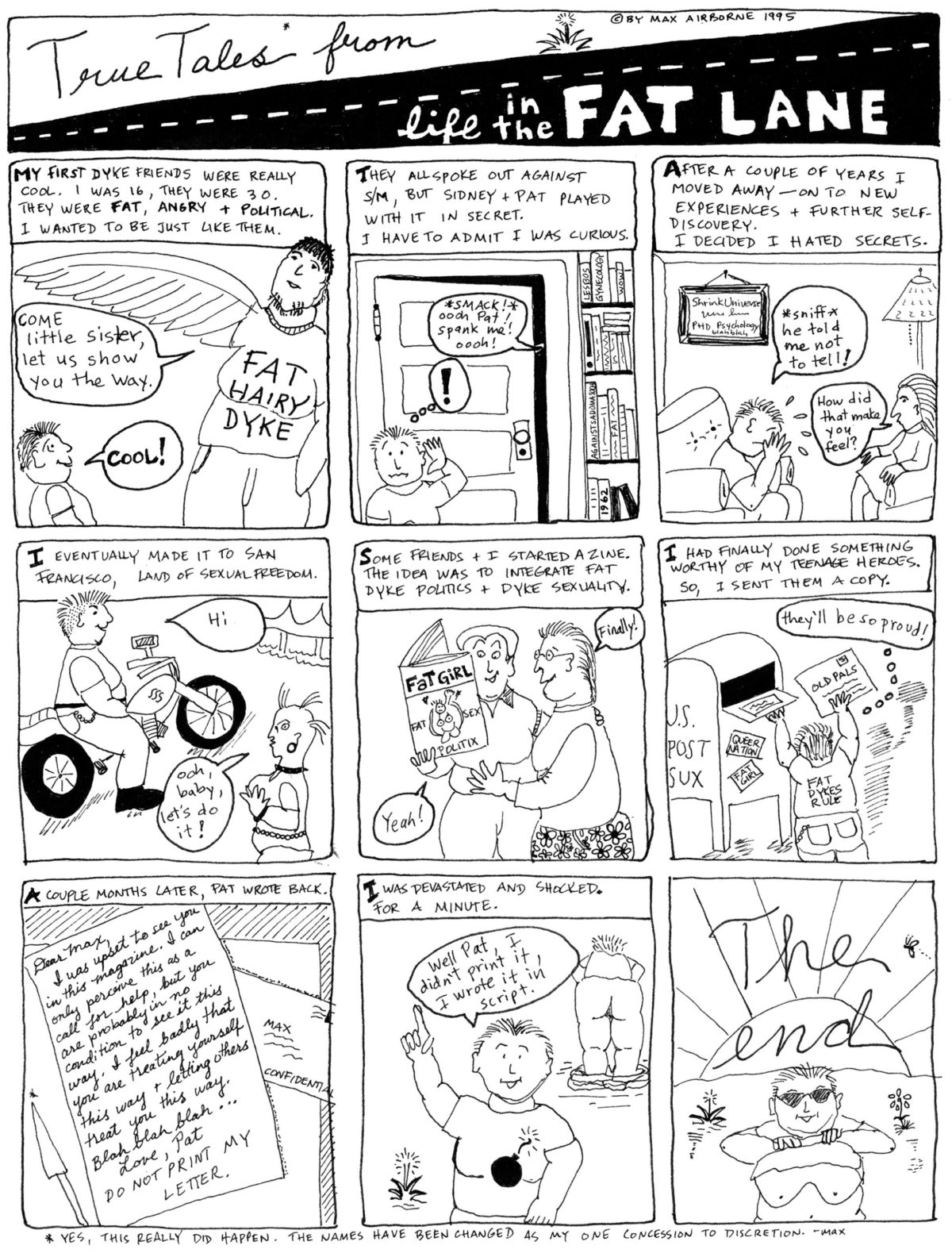
A comic hand drawn with black ink on white paper. A series of frames mixing drawings and handwritten text.
[A banner across the top contains a black, empty road, with a white dotted line separating two lanes, one much narrower than the other. One dandelion plant in bloom is by the side of the road. Overlaid on this scene are the words, “True Tales from Life in the Fat Lane.” Under the banner are 9 equal sized rectangular frames, in 3 rows of 3.]
1 . My first dyke friends were really cool. I was 16, they were 30. They were fat, angry and political. I wanted to be just like them. [A short, fat baby dyke with short hair looks up, in awe, at a taller, older and slightly fat dyke with short hair, a scruffy beard, low-hanging breasts in a t-shirt that says “Fat Hairy Dyke,” and a giant wing for an arm. She’s holding her wing out toward the kid and saying, “come, little sister, let us show you the way.” The kid, clearly excited, responds “Cool!]
2. They all spoke out against S/M, but Sidney and Pat played with it in secret. I have to admit I was curious. [The kid stands outside an almost-closed bedroom door, looking shocked, cupping their ear to listen to the sounds from inside the dark bedroom. They’re hearing “*smack!* Oooh Pat! Spank me! Oooh!” On the wall next to the door are shelves of books, including “Lesbos,” Gyn/Ecology,” “Against Sadomasochism,” “Fat,” and a yearbook entitled “1962.”]
3. After a couple of years I moved away – on to new experiences and further self-discovery. I decided I hate secrets. [A psychologist’s office, diploma on the wall, lamp in the corner and two stuffed chairs. In one chair, the kid is crying into their hands, sniffling as the say “he told me not to tell!” Directly across, in the other chair is a middle-aged woman in a long-sleeved dress, looking very serious while saying “how did that make you feel?”
4. I eventually made it to San Francisco, land of sexual freedom. [The kid at 27, sits on a motorcycle, hands on their thighs, wearing jeans with a chain fastened to their wallet, a tshirt, a black leather belt and boots. Their hair is cut into a fauxhawk. They say “hi” to another queer-looking person with stretched earlobes and facial piercings, wearing a spiked collar around their neck and pushing up their breasts with their hands, who says “Ooh, baby, let’s do it!” The Golden Gate bridge and the water shows in the background.
5. Some friends and I started a zine. The idea was to integrate fat dyke politics and dyke sexuality. [Two white, fattish dykes stand smiling with an arm around each other. One wears a polo shirt and has a grown-out crew cut. The other has a mullet, small round glasses, a sweatshirt and flower-print pants. One holds a FaT GiRL zine in her free hand, out so they can both see it. The cover show a naked fat dyke and the words “Fat, Sex, Politix.” The two dykes look thrilled and exclaim, “Yeah!” and “Finally!”]
6. I had finally done something worthy of my teenage heroes. So, I sent them a copy. [The short fat kid puts an envelope addressed to “Old Pals” into a mailbox. Thkid is wearing a t-shit that says “Fat Dykes Rule,” and thinking “they’ll be so proud!” The US POST mailbox had been vandalized/beautified with stickers that say “Queer Nation” and “Fat Girl.”]
7. A couple months later, Pat wrote back. [Close-up of a handwritten letter, a letter opener, and an envelope addressed to Max, along with the word “Confidential.” The letter reads, “Dear Max, I was upset to see you in this magazine. I can only perceive this as a call for help, but you are probably in no condition to see it this way. I feel badly that you are treating yourself this way and letting others treat you this way. Blah, blah, blah… Love, Pat. DO NOT PRINT MY LETTER.”]
8. I was devastated and shocked. For a minute. [Max faces you in the foreground, wearing a t-shirt printed with a classic black round bomb with a lit fuse. Their eyebrows are raised as they hold a finger in the air as if making a point, and they proclaim “Well Pat, I didn’t print it, I wrote it in script.” A dandelion blooms on one side of Max, and in the background is another view of Max from behind, bent slightly forward, and their ass bare with pants fallen to the ground, in a gesture of mooning.]
9. The end. [The sun sets on the horizon, flowers bloom casting sunset shadows, and Max, grinning in their sunglasses, holds up their shirt, flashing their boobs at you.]
[At the bottom it says: PS Yes, this really did happen. The names have been changed as my one concession to discretion. –max]
♦ MAX: “Thank you for finally representing me.”
♦ BERTHA: “Thank you for showing my body; I opened up Fat Girl and there was my body in a magazine.”
♦ BARB: It’s been revolutionary: publishing images of fat dykes having orgasms, eating, feeding each other, being happy—just being. Breaking these taboos and feeling pretty good about it.
♦ APRIL: We publish 2,000 issues at a time, and they go out all over the world. We get a lot of letters that say, “I live in Podunk, Utah, and I walked into a store and saw Fat Girl, picked it up, and it was the most incredible experience of my life. If I had seen you 35 years ago … “
It’s inspiring to know that we can do something. With all the trauma we get every day, being fat in San Francisco, it’s nevertheless much easier here than in the rest of the country. To be able to do something where we have support, and send it out to people who are really solitary … well, our whole culture is about hating yourself, and it feels amazing to be able to counter that mentality.
♦ MAX: Like the Voice of America: “It’s all okay, everyone—just Be Yourself!”
♦ CANDIDA: Fat Girl has to do with being “out” in terms of being queer, and also with being involved in SM—which, to be sure, doesn’t appeal to everyone. We’re not doing one of those cheesy, fake, glossy magazines that doesn’t represent anyone; some of those glossy lesbian magazines pain me. For someone who feels really isolated, fat and queer in the middle of nowhere, with nobody around who understands, I can imagine that Fat Girl provides a much-needed solace.
♦ MARGO: When I look at Fat Girl, I see an entire spectrum there. I see pleasure, I see pain, I see fucking, I see wonderful poetry and stories and photographs. I look at it and think, “Anything is possible!”
♦ MAX: On the other side of the coin, some people look at Fat Girl and all they see is the fact that it has SM in it, and they won’t look any further. We just got a letter from a bookstore owned by a fat dyke in Albuquerque: “Thank you for sending a sample of your magazine. However, given that only a certain percentage of our readers are lesbian, only a certain percentage are fat, and only 2% are into SM, there’s no market here for your magazine—
♦ BERTHA: She got it down to 0.15% !
♦ MAX: She doesn’t realize that a lot more people than fat SM dykes read Fat Girl. Probably 80% of our readers are not SM dykes. They’re all over the country, doing whatever.
♦ BARB: A Different Light bookstore in San Francisco said Fat Girl was the highest-selling zine they’d ever carried. They put us up front with the queer glossies.
♦ BERTHA: I wrote back to that woman in Albuquerque: “We’re offering you Fat Girl on consignment. I would think you might test it before you make this assumption that it won’t sell in your store.” It’s amazing; people are so prejudiced—duh! [everyone laughs]
♦ BARB: And there wasn’t a lot of SM in that issue—
♦ CANDIDA: Just a photo of you pissing in a cemetery on the back cover!
♦ BARB: But is that SM?
♦ APRIL: To get back to the point of humor, we could be really serious and heavy if that’s all that we wanted to talk about, but we have to get through life, too! And we use humor to do that.
♦ BERTHA: That’s why I first did the “Kitchen Slut” column. I wanted it to be fun, silly, ·sexy, and about food! To be political and funny. I did it humorously and tongue-in-cheek about sexy, good, fattening foods! No guilt allowed in my column!
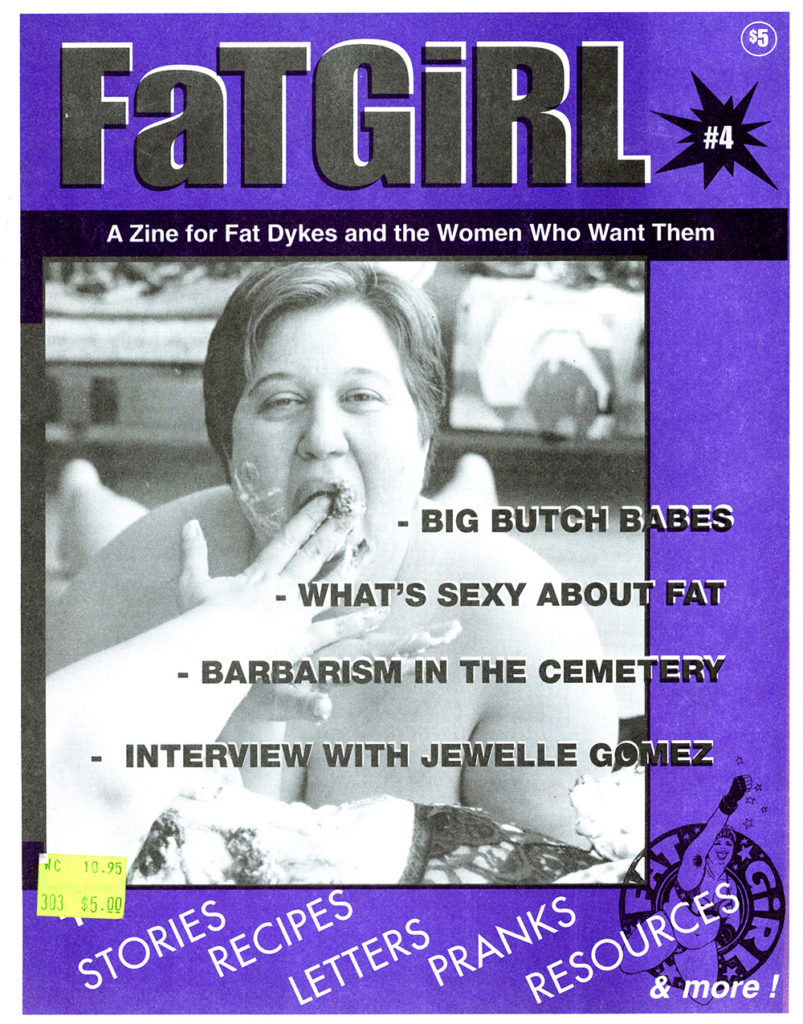
♦ CANDIDA: The first time I read “Kitchen Slut” I was laughing out loud—especially at the little captions under your photos.
Everybody working on Fat Girl has had to read and re-read people talking about the most intense issues of their lives. It’s so heavy that—
♦ BERTHA: —it needed a little bit of heavy cream to lighten it up!
♦ BARB: Publishing a zine involves a lot of responsibility. It takes a lot of responsibility to ask someone to pose for you in a revealing way and write about the most personal things that have happened to them regarding their bodies. We’re very thoughtful as to where we place each piece when we mix up the articles. One of our mottos is “Go for a ride with Fat Girl” and it really is a ride: from beginning to end you experience a whole spectrum of emotions.
One of the reasons why it’s hard to be in Fat Girl and why I recently left the collective is: it’s been so difficult to understand what my feelings have been about everything we’ve published. Everything has happened so quickly that if we were just publishing “hard” or depressing content, I feel I might have gone off the deep end! I really needed to stop and step back for awhile. We have created and opened up a lot of dialogue about people’s feelings and deep personal concerns, and if we didn’t include joy and humor … that’s the kind of energy people need to go beyond the difficult experiences that happen to them.
♦ V: You ‘re trying to present truth, unwatered down—
♦ MAX: That’s the idea!
♦ BERTHA: And some of it is fun! We’re very silly people.
♦ CANDIDA: Some of our better inspirations have come during burnout periods.
♦ MAX: It’s kind of ironic that the truth is what’s so appealing to people, and then for example we went to OutWrite last year (a national gay and lesbian writers’ conference) and Barb from Fat Girl was on a panel with members of other publications. The discussion was about gay magazines having sold out to advertising because “that’s what the readers really want.” We were sitting there going, “Are you sure?!” [laughs]
♦ BARB: They even said that their readers weren’t intelligent, and that they had to pander to the lowest common denominator! Also, that they have no responsibility to their readers, that people basically aren’t too smart, and you don’t want them thinking too hard. “They like that advertising; they like that glossy feel. That’s what they’re buying us for. And besides, we’re going to be here a year from now .. . “
♦ MAX: —insinuating that Fat Girl would not be.
♦ BARB: That’s what a lot of publishing is about: selling advertising. People don’t realize that’s what TV is all about. That’s what most of our venues of communication are about: selling us something. That’s why zines are so exciting: they’re really about communication and ideas, not about selling other people’s products. Zines are about creating culture and creating community (or alienating other people, or writing about the most alienating things you can think of because that’s what gets you off, but—hey, you’re doing it for yourself!).
♦ CANDIDA: This is what feels so life-saving—not just zines, but other D-I-Y (Do-It-Yourself) projects.
♦ APRIL: I feel that the amount of struggling you do to collectively produce a project, and collectively decide what you’re going to do, really keeps you honest and strengthens the work. Because all of this is background for what we end up saying and doing, not just in the magazine, but in our lives. Magazines that are more corporately-structured don’t have a check-and-balance to keep them honest. Our early roundtables were really personal and honest and in-depth because we all had to work with each other. Because of this kind of intimacy, we were able to say things in-depth in a way that I don’t think you can if you don’t have that kind of community built up.
♦ BARB: In our roundtables (which are transcribed discussions), when talking about fat dyke issues, it’s hard to separate all the personal and political issues which we all experience: class, racism, issues around disabilities—the whole spectrum of how we experience life with its different levels of cultural alienation. We were trying to provide a place (and another level of accessibility) where people who perhaps weren’t writers or artists could find a voice and discuss important issues.
♦ CANDIDA: For Fat Girl #2 some people sent in their own roundtables. It would be so great if more people we don’t know would do that.
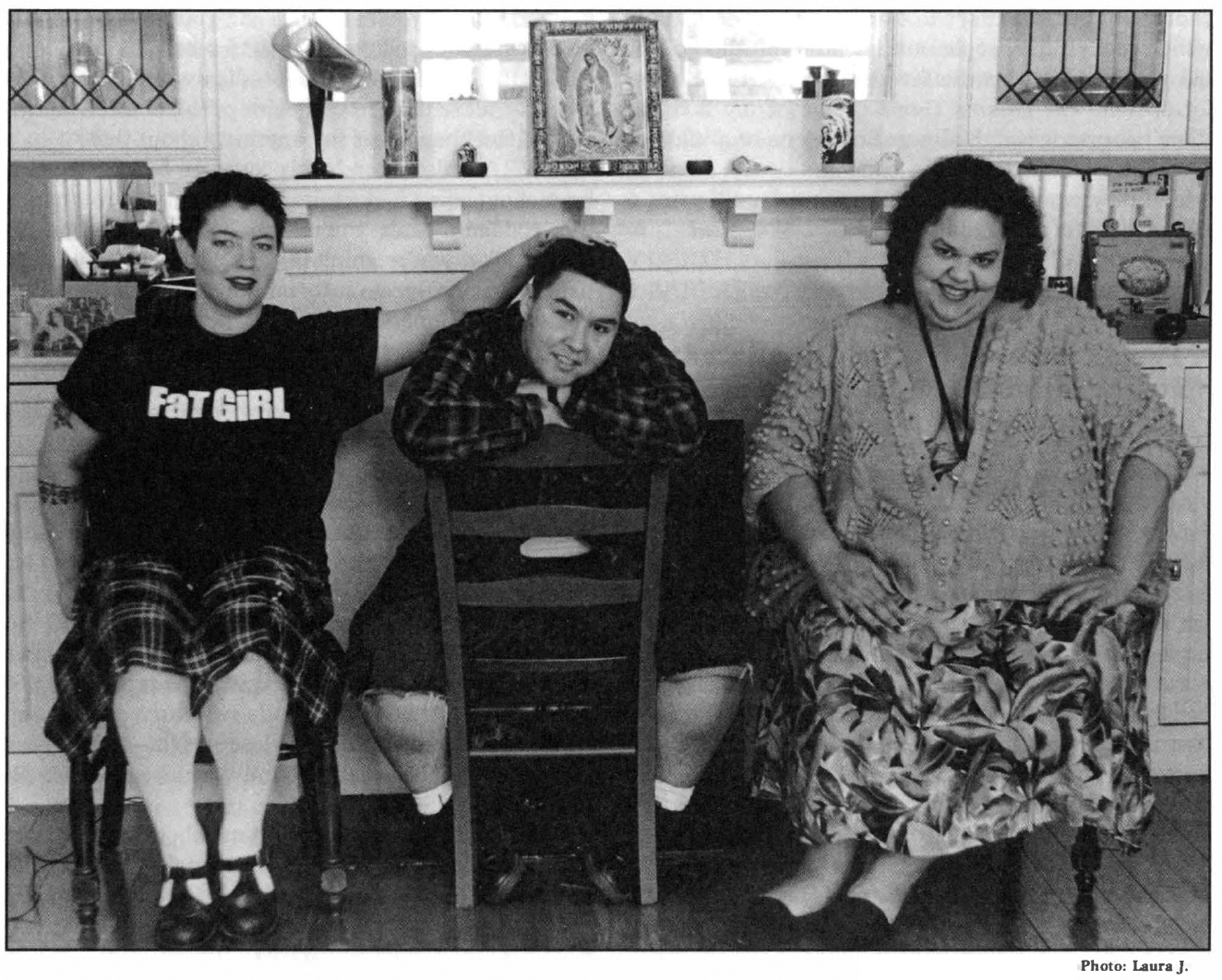
♦ V: Earlier you mentioned other publications, like FAT!SO?—
♦ MAX: There’s “Radiance: the magazine for large women“—
♦ CANDIDA: Which just did a big feature on the new generation of fat activists, and didn’t include Fat Girl or FAT!SO?, which have both made a big difference to a lot of people.
♦ APRIL: There’s another zine from a young woman, Nomy Lamm, called I’m So Fucking Beautiful. A glossy photo book recently appeared, Women En Large, plus some other fat women’s anthologies.
♦ BERTHA: A woman from England, Lee Kennedy, sent us a couple of cartoon zines.
♦ MAX: Check out the “resource” sections in Fat Girl, which list other publications, books—everything we know, basically, is in there.
♦ BARB: Also, Max has put together a web site for Fat Girl. We’ve gotten a lot of press attention from other web publications; one from the U.K. included us in their “Top 50 Most Interesting Sites.” Time magazine mentioned us in an article on on-line publications; the Nation used us as an information resource, too.
♦ MAX: For being such a fringe thing, we sure are popular! Weird!
♦ CANDIDA: And our e-zine is very different from the paper zine, for a number of reasons. Resources and announcements are updated before the paper zine appears, of course.
♦ MAX: There is additional information, like I compiled a list of all the songs I could come up with that had any kind of mention of fatness in them. I included as many lyrics as possible and put them on the Web, with links to the web-site of musicians who have done anything related to fat. I’m into resources.
♦ APRIL: In terms of resources, there is the Fat Lip Readers Theater, a local fat women’s readers’ theater group, and 4 Big Girls, a performance collective of fat black women in Seattle—
♦ MAX: They’re fuckin’ awesome.
♦ CANDIDA: It’s definitely not just us; there’s a lot out there.
♦ BARB: For the recent San Francisco International Gay & Lesbian Film Festival, we were asked to curate a program on fat dyke issues under the heading of Radical Women’s Body Politics. Recently I got a call from a woman who curates Florida’s International Gay and Lesbian Film Festival—she attended our program and was so affected by it that she took one of the short films and had it run with their top premiere film, which was The Incredibly True Adventures of Two Girls in Love (which I have spoken about as so fat-phobic). She was so affected by that—she had her eyes opened—that she said, “I can’t in good conscience run this feature film without including something that presents this issue,” so she ran this short before the feature. There’s definitely been a cultural synergy of ideas; a shift in how people are looking at things, and what they feel comfortable in taking on …
♦ CANDIDA: We push constantly for other people to get involved at production levels, like for film festivals, Dyke TV …
♦ APRIL: By the way, I dance and work with a choreographer who likes to use fat women dancing —which really flips people out. I search for and collect old videos which feature fat women, and there are a lot of ’em. The Pajama Game is one of my favorite films because it has this incredible scene of a middle-aged fat woman dancing a song-and-dance number, which they would never do now. Someday l’ll print a resource list of these films in Fat Girl.
♦ BARB: Recently, A Circle of Friends got a lot of attention. It was supposed to be about the most popular, most eligible boy in school falling in love with this fat woman and dealing with it. The actress they chose wasn’t fat at all, and her contract was that she gain weight for the role and have a trainer afterwards to lose the weight. That’s a very Hollywood example of how this issue is approached—
♦ MAX: And they couldn’t even use a fat actress, for crying out loud.
♦ LAURA: Ricki Lake was fat in Hairspray, but now that she has her own talk show she’s become thin and weight-obsessed—it’s sad. She was beautiful.
♦ CANDIDA: In every interview, she says it’s the hardest and most “fulfilling” (so to speak!) thing she’s ever done. I know; it’s sad. JOHN WATERS has been a big inspiration to a lot of us; a bastion of sanity in a weird way. Perhaps it shows.
♦ APRIL: I was excited about two Australian films, Strictly Ballroom and Muriel’s Wedding which both used fat characters of all ages. They lead real lives; they sing and dance. The great thing about Muriel’s Wedding is: she has this whole life shift; the world becomes wonderful; she finds herself, and it’s not about her losing weight. She goes off to the city, dumps her family, finds a guy, dumps the guy, finds a girlfriend who’s like a good friend—and it’s not about her being thin at the end. I didn’t care that she was a normally thin actress who gained weight for the role; the moral of the story was wonderful. Maybe Australians are different from Americans; maybe they’re not so weight-obsessed—
♦ MAX: Wait a minute! An American woman married an Australian man whom she met on the Internet. She wanted to move to Australia, and they would not let her in the country because she was 24 pounds overweight! That was in Newsweek.
♦ CANDIDA: And here in the U.S. a man was released from jail under the stipulation that he lose weight while on parole. He didn’t, so they put him back in jail!
♦ SONDRA: If you’re overweight, you can’t get decent healthcare; they tell you to lose 15 more pounds.
♦ APRIL: Yet they’ve done studies which show that it’s a far more dangerous health problem to be underweight. But they never say anything about that.
♦ CANDIDA: Also, there’s this common fear fat women have about going to doctors. Every time you do, there’s this goddamn scale you’re supposed to step on—no matter what you’re going in for! We’re trying to publish more resource information from fat-positive health practitioners.
♦ BARB: Women are dying in this country because they’re being misdiagnosed; they’re being told, “You’re a fat person; your health problem is that you have to lose weight.” Doctors don’t take your health issues seriously.
♦ SONDRA: There was a recent case involving a 14-year-old girl whose symptoms were: she was missing her period, and she felt really sick in the mornings. Her mother took her to a gynecologist who said, “You’re missing your period because you’re overweight.” So this 14-year-old girl ended up having a baby she didn’t want to have—obviously, she was pregnant!
♦ BERTHA: A woman recently went to a doctor who kept telling her, “You need to lose weight—that’s your problem.” But her real problem was: she had cancer. She died.
♦ LAURA: She personally told me about going to the doctor and saying, “Look, something’s wrong,” and being told, “No, you just need to lose weight.” By the time she was properly diagnosed, it was too late.
♦ APRIL: I’ve gone to medical appointments where you want them to investigate something specific, and all they talk about is some diet you ought to go on.
♦ SONDRA: They love to tell you that you’re “morbidly obese”—
♦ CANDIDA: —just the description makes you want to vomit—
♦ MAX: That’s the idea! [laughs]
♦ V: If you present fat-positive medical information in the pages of a professional-looking publication, it’s likely to be taken more seriously—
♦ BARB: Our objective was to be very readable, so that people could pick up Fat Girl and easily get information and advice.
♦ CANDIDA: We were part of a course curriculum at UC Santa Cruz—required reading!
♦ SONDRA: They have an anti-discrimination law there, regarding fat.
♦ V: Do you have an office?
♦ BARB: No. Production is done in people’s homes; the last two issues were done in my bedroom on my Mac.
♦ MAX: When you’re a collective, working out of one person’s house is difficult. If other people want to do something, they have to come to your home to do it.
♦ BARB: It was hard to give up my bedroom to be Production Central for a month. It’s like, “I’m going to work now, so you get to use my computer.” There was somebody there all the time, except when I was sleeping. But even when I was sleeping, the computer was FTPing files! Now I can’t stand the sound of the computer
♦ BERTHA: A slight case of burnout! Flashbacks, nightmares …
♦ V: So the initial money went to pay for printing, shipping and—
♦ CANDIDA: Syquest tapes.
♦ BERTHA: And if anybody wants to solicit advertising for us, we pay 10%!
♦ BARB: Besides us, all the people who read Fat Girl make it happen—they send us snapshots, photo booth pictures, their personal experiences, rants … if it wasn’t for the excitement that readers share with us, Fat Girl would not exist. It’s about community. That’s where the magic is: in that exchange.
♦ V: What are some other projects you want to do?
♦ MAX: I want to do a comic zine. For Fat Girl I started drawing comics—that was the first time I’d ever tried that. I want to draw about more diverse topics that aren’t necessarily appropriate for Fat Girl.
♦ BARB: I want to do another zine taking the vision that’s in Fat Girl and extending it to all the other people in the community who are alienated and aren’t having their lives represented in the media.
♦ APRIL: I just want to see Fat Girl keep going and reach more people.
♦ CANDIDA: People have definite taste discrepancies, and come from different places, but there has been a level of respect that has to do with commitment and family. Considering the fact that most people have day jobs, it’s pretty amazing that there was a tight group for a year and a half.
♦ V: What are your day jobs? Barb, you work in publishing—
♦ MAX: And during the evening she’s the Secretary of Defense—
♦ BERTHA: —for the New Anarchist Revolution!
♦ BARB: Most of us have been anarchist activists for a really long time. To do publishing, I learned what I needed to learn to make Fat Girl happen.
♦ LAURA: I’m a barber and I’m not ashamed of that. I use clippers; I’m not a “hairdresser.”
♦ APRIL: I was an assistant at a law firm, but the law firm closed—yes! It was a very corporate environment with fat hatred, woman hatred; everything that wasn’t “straight white male with money ” was not okay. And Fat Girl was my secret vice: “I do this day job, and at night I bust out and become who I really am!” This feeling is probably true for a lot of people who do zines: this is where their real life happens. Anyway, right now I’m unemployed and have my own business making corsets—that’s fun.
♦ BERTHA: In the course of Fat Girl I also became unemployed. I sell ads for Fat Girl and Cuir Underground, and I am a Reiki healer and teach Reiki classes. I also make boxer shorts for big butches and whoever else wants them. In my spare time I do drawings.
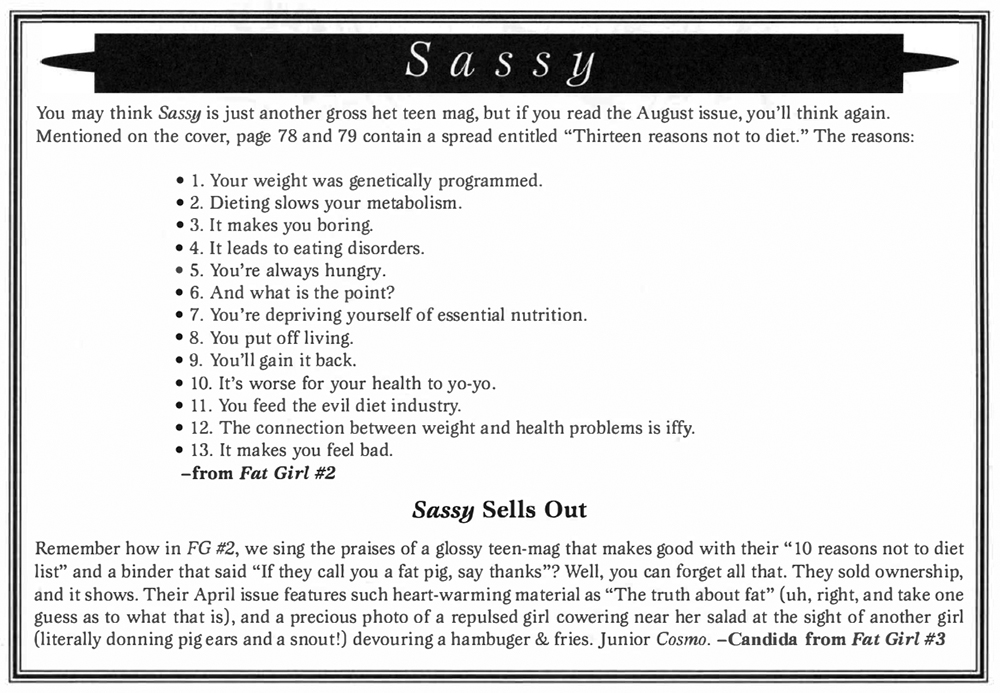
• 1. Your weight was genetically programmed.
• 2. Dieting slows your metabolism.
• 3. It makes you boring.
• 4. It leads to eating disorders.
• 5. You’re always hungry.
• 6. And what is the point?
• 7. You’re depriving yourself of essential nutrition.
• 8. You put off living.
• 9. You’ll gain it back.
• 10. It’s worse for your health to yo-yo.
• 11. You feed the evil diet industry.
• 12. The connection between weight and health problems is iffy.
• 13. It makes you feel bad.
– from Fat Girl #2
Sassy Sells Out
Remember how in FG #2, we sing the praises of a glossy teen-mag that makes good with their “10 reasons not to diet list” and a binder that said “If they call you a fat pig, say thanks”? Well, you can forget all that. They sold ownership, and it shows. Their April issue features such heart-warming material as “The truth about fat” (uh, right, and take one guess as to what that is), and a precious photo of a repulsed girl cowering near her salad at the sight of another girl (literally donning pig ears and a snout!) devouring a hamburger & fries. Junior Cosmo. -Candida from Fat Girl #3]
♦ MAX: I constantly complain about not having role models. So we have to try to be our own.
♦ BARB: Fun, perverse, political—
♦ V: And creative.
♦ MAX: Absolutely.
♦ APRIL: I always felt I was trying to change the world by living my life and being different in the world, but being able to do it through a zine has had a much greater impact. It’s like we took the zine and threw it in the water and the ripples were so much bigger than I could ever have achieved by myself.
♦ MAX: We were in Time magazine: one sentence with a major typo. They called us “apolitical” instead of “a political” group.
♦ CANDIDA: Who would expect an apolitical fat dyke publication? Not me!
♦ V: But that’s so characteristic of major media. You’ve had one personal encounter, and they print one sentence which has a gross error. Think about all the other stories you read, which involve dozens of sentences—
♦ BARB: I’ve been trying to tell people that for years!
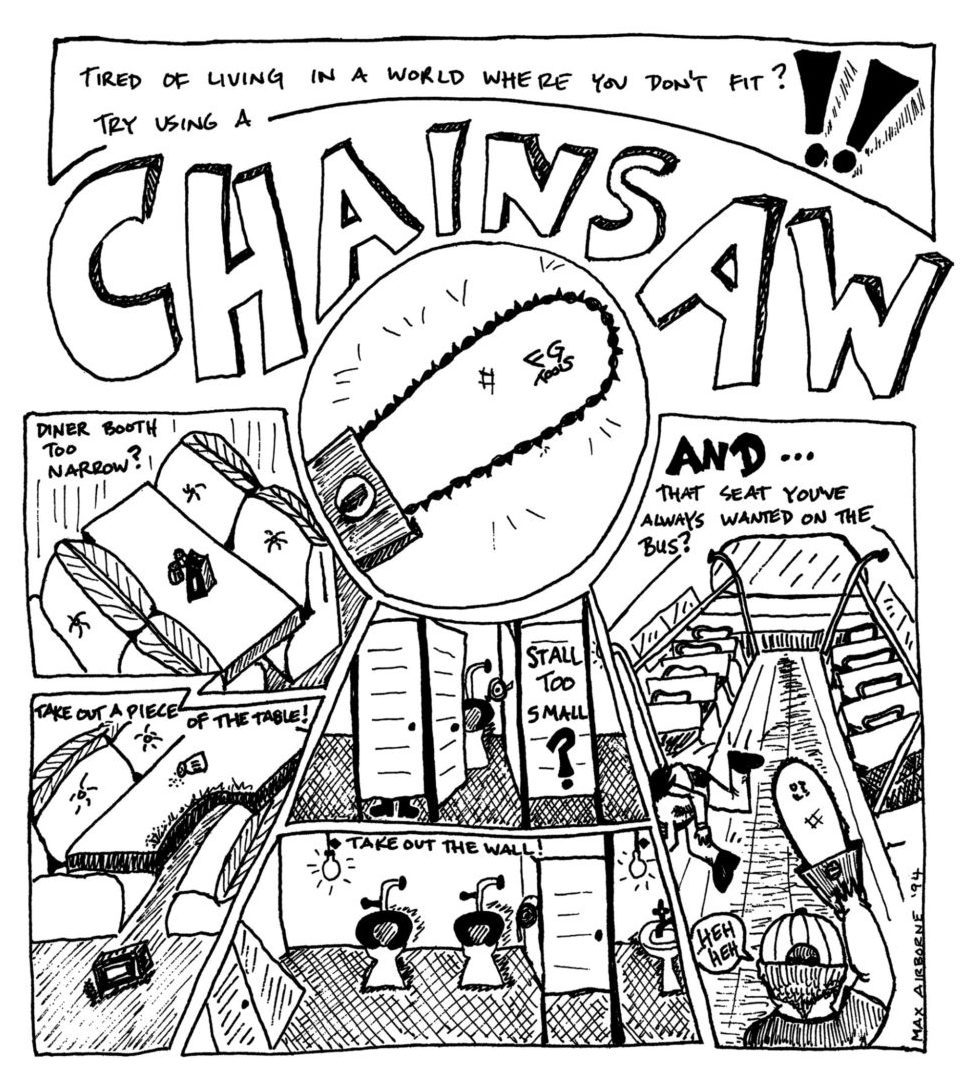
A comic hand drawn with black ink on white paper. A series of frames mixing drawings and handwritten text. Frames are arranged around a central circle containing a chainsaw with sparks coming off, showing it’s running. On the blade it says, “FG TOOLS.”
Top: Tired of living in a world where you don’t fit?!! Try using a CHAINSAW [The word “chainsaw” appears in large bubble letters wrapped whimsically around the top half of the circle.
Lower left: Diner booth too narrow? Take out a piece of the table! [Two images: 1. An empty diner booth seen from above, with barely an inch between each cushioned seat back and the table. On top of the table is a napkin dispenser, and salt and pepper shakers. 2. The same diner booth, but with a chunk cut out where a person could sit. There’s sawdust on the table, a salt shaker is on its side, and the napkin dispenser is on the floor.]
Lower middle: Stall too small? Take out the wall! [Two images: 1. A public bathroom with very narrow toilet stalls that have toilet paper attached to the side walls, making the stalls functionally even narrower. 2. Same stalls but with doors and walls removed so two toilets are right next to each other in one space.]
Lower right: And that seat you’ve always wanted on the bus? [The inside of a city bus looking toward the back from the front. A fat person in a baseball cap stands in the foreground, looking toward the back of the bus, holding up a chainsaw and snickering, “heh, heh.” The bus has only one passenger who is halfway out the door, running.]
♦ V: This is a terrible question, but-it must be hard for you to find clothes-
♦ MAX: Uh-huh.
♦ BARB: What’s so terrible about that question?
♦ APRIL: That is so realistic.
♦ BERTHA: That’s the actuality that everybody here has had to live with.
♦ LAURA: In the first issue, there was a survey about “What do you dislike about being fat?” The most common response was: “It’s hard to find clothes.”
♦ PANDOURA: I remember growing up as a basic femme (which meant clothes were important) and having two shirts and two or three pairs of pants and a couple of pairs of underwear, to wear for an entire year, and thinking to myself, “I’m fat; I’m never going to be able to have clothes and dress the way I want to. I’m fat, ugly, stupid, and lazy.” Every time a fat gir] walks into a store at age 12 or 13 and can’t buy anything, or the mom takes her to the “Large Size” department where all she finds is polyester, it solidifies the notion that “I can’t do anything about this-I’m stuck.”
♦ CANDIDA: Or you gain weight, and can’t necessarily afford to buy the clothes that are out there. It’s grim.
♦ BARB: This is why resource networking has been an important part of Fat Girl. A lot of people have commented about the zine: “Y’know, you just make being fat so glamorous! Where do you get your bras?” Questions like this are so vital, yet seem silly at the same time. We spend a lot of time just figuring out how to get by. And there’s more than just clothes: not fitting into seats, transportation, restrooms, restaurants, flying in an airplane, getting into a wheelchair or ambulance, or through turnstiles-there’s so much out there. We really need to share resources with each other, because no one is putting them out there for us.
♦ CANDIDA: Only the American Disabilities Act has changed anything to accommodate us. There is still this belief that you should change the size and shape of your body rather than redesign a fuckin’ chair!
♦ PAN: Max did a comic in Fat Girl that said, “Tired of a world where you don’t fit? Try using a chainsaw!” It’s going to take a lot of people saying, “I’m no longer accepting this crap!” to produce results.
♦ BARB: There’s an old anarchist song about “Your job and your work are two different things.” I may have lost some opportunities in my life, but I’ve created so many more opportunities through pursuing things in the most honest way for myself.
♦ V: Max, what’s your job?
♦ MAX: I work for a company doing development for the Web. I keep learning all these new web tools and programming techniques and then I apply them to Fat Girl’s web site! Everyone is very thin there-I’m an anomaly. But they knew about my Fat Girl web pages-in fact, that’s how I got the job.
♦ PANDOURA: I’m a fourth grade teacher and my kids chase me across the schoolyard going, “Hail the fat girl! Hail the fat girl!” I brought Fat Girl to school; the kids know all about me.
♦ CANDIDA: Age is an issue with us. We put “Not Sold to Minors” on our zine because the reality is: if there’s any suspicion of kiddy porn involved, they can raid you and keep all your stuff for months and you’ll never get all of it back.
♦ V: You said that kids as young as eight are already obsessed with being thin-
♦ PANDORA: That’s why I’m very “out” with kids about fat politics. Sometimes I bring sugar snacks to school that these kids refuse to eat, like little girls who are gymnasts. They eat rabbit food and skip meals and they’re sickly. I told them, “You guys, I’m 20 years o]der than you and I’m fat, and I can outrun you and out-chase you. Does that tell you something?”
Every minute of the day they get input warning against being “fat and ugly”-twenty-four/seven. If you’re a gir1, it’s not okay to be even chunky. Teachers prohibit words that are racist, but they will ]et kids call each other “fat,” “ugly,” “faggot,” “dyke,” and “queer.”
Now companies are advertising in schools: you see Nike posters of thin gymnasts everywhere. It’s all about money.
♦ BARBARISM: The government and Jenny Craig have been working on this “Shape Up, America!” project together, and a lot of people who write to us about their experiences of being fat remember their families putting them on diets when they were four and five years old!
♦ CANDIDA: People are even feeding their infants fatfree formula!
♦ BARBARISM: And there are diet programs for pets now; articles are appearing on the obesity of American animals.
♦ V: Candida, how are you employed?
♦ CANDIDA: I work for a computer science think tank where I’m kind of a high-tech grunt worker formatting documents and doing Web pages; I’m pretty good with Unix. I work out at Chinese-Indonesian kung-fu; it’s called Silat. I used to do a lot of organization and demo work in the SM community, doing play parties, workshops, and having multiple partners every week! I used to be much more of a schmoozer and networker; now I’m a hermit like everyone else-I go home from work and hide with my computer.
♦ MAX: Wow, what a depressing picture!
♦ CANDIDA: I have a life; it’s just not as interesting as it used to be.
♦ MARGO: What our profession is isn’t everything. I work at a job where I should have a master’s degree—I’m a medical librarian—but they hired me just because they like me. Most of my life I was a cook and baker. I don’t think I’m any more “developed” for having a professional job now.
♦ SONDRA: I’m in law school. This has been a good semester, because I’ve been able to write about SM and fat issues. But it’s hard to talk about politics, because everything at school is on the level of “Do white men have privilege in our society?” [laughs]
♦ CANDIDA: How can you go to school and not be homicidal?
♦ MAX: Want to go to the shooting range this weekend?
♦ BERTHA: Max, haven’t you killed just about everybody in your cartoons? Homicidal tendencies are definitely an asset in Fat Girl!
♦ BARB: They’re not present, but both Selena and Oso have been with the collective from the beginning. Oso worked in bookstores most of their adult life, and Selena worked restoring Oriental rugs; now she’s training to do computer animation.
♦ V: So how did you get the money together for each successive issue? [everyone looks at Max]
♦ MAX: I go to the bank. [laughs]
♦ BERTHA: We have a new person with a credit card who’s going to float us a loan for the next printing
♦ MAX: $3,500 for printing and tapes, and a few hundred for postage. We pay in cash—interesting experience. “Okay, I’ve got $3,500 in cash and I’m going to the printer now. Anybody looking at me? Anyone following me?”
♦ BARB: The last time we did that was pretty intense; it took about 45 minutes at the bank to get that much cash with a credit card. This was at 16th and Mission, it was really busy, and people were watching what was going on. I got really nervous when we walked out. The bank teller asked, “Do you want this in anything?” and Max said, “No,” and stuck the whole wad in her pocket.
♦ MAX: Where else was I going to put it?
♦ BERTHA: In your bra!
♦ MAX: I didn’t have a bra—oh, in my underwear. Yeah, I’ll just give the printer a wad of juicy $100 bills!
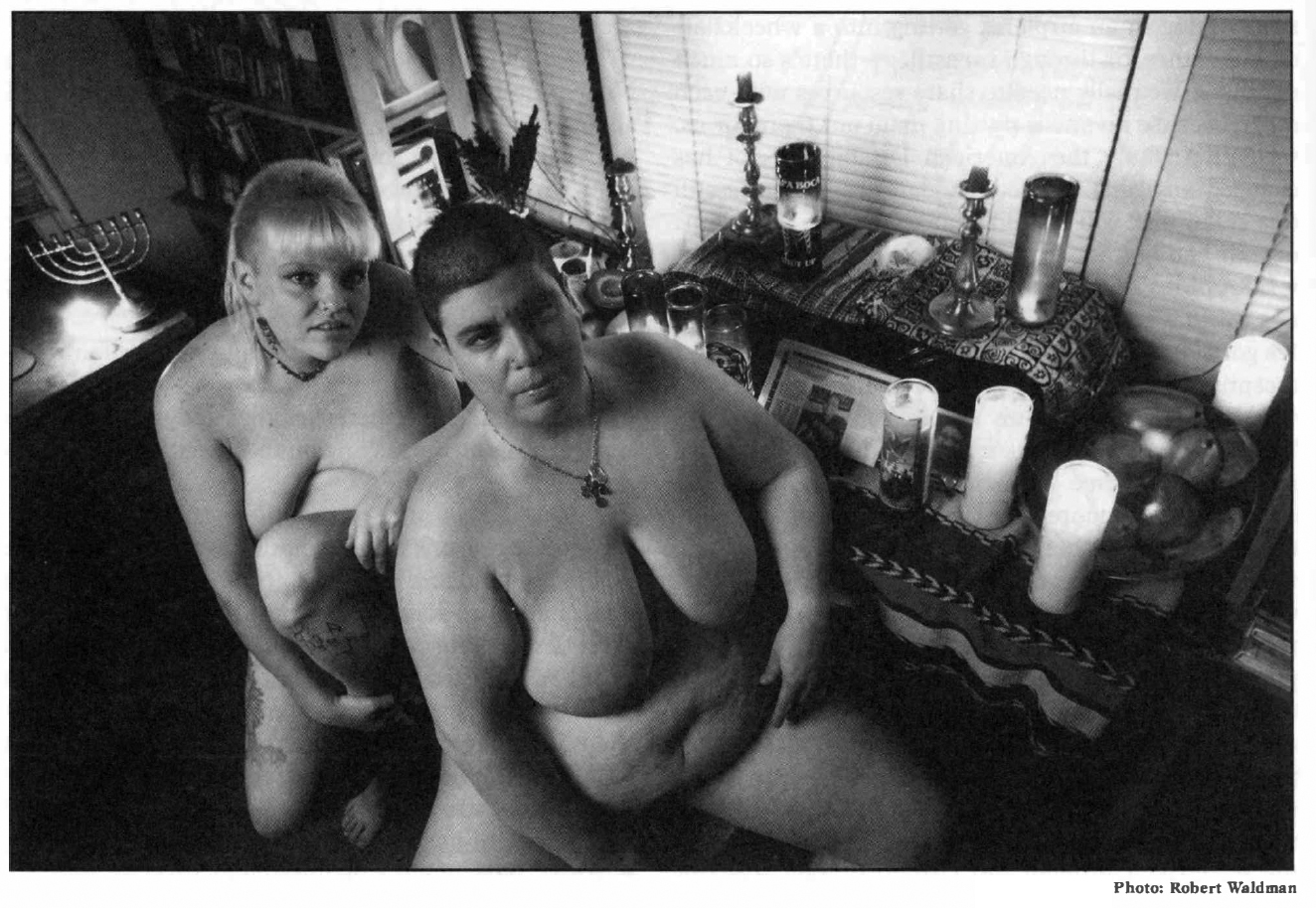
♦ BERTHA: We’ve gotten some contributions from people who want to see Fat Girl continue, and have had a few pretty amazing benefits. We got support from the club MuffDive, Red Dora’s Bearded Lady Cafe and Old Wives Tales.
♦ V: Do men write you letters?
♦ CANDIDA: Barb gets a lot of fan mail from men who send photos of themselves in lingerie, and write detailed three-page fantasy letters—
♦ BARB: Three pages—I got this 20—page history from some guy who was trying to have this intellectual/erotic exchange with me. And that’s not what we’re about.
♦ V: You include SM content, which is considered adventurous. What are your thoughts on this?
♦ BERTHA: We had a whole dialogue in the last issue because someone wrote a letter about this. Basically we said that we’re perverts, we enjoy SM, it’s important to us, and we’re going to print it. If you don’t like it, send us stuff you do like and we’ll print that, too! It’s important that we print what we believe in. We print what turns us on, what we think is wonderful.
♦ BARB: When we started out, the people involved had all been active in the pervert scene. Being truthful and talking about things and really being yourself and doing things for yourself, and also doing educational work, is important. This legacy carried over to Fat Girl. In the SM community, fat women’s sexuality is more visible than in the dyke community as a whole.
♦ V: When Good Vibrations first started, I thought it was a courageous enterprise. Just look at how it’s grown—
♦ BERTHA: Remember the back room, the vibrating chair and the little museum?
♦ CANDIDA: They still have the museum, the back room, and now they have mail orders, plus a second store in Berkeley.
♦ BARB: But at the same time, there are re—virginization groups all over the country now—
♦ MAX: —re-installing their hymens— [laughs]
♦ BARB: A lot of them are at universities, and are for men and women who lost their virginity, but want it for marriage. Some women are going in to have surgery for hymen reconstruction. At these clubs, they can meet other virgins—
♦ JUDY: —and virgin wanna-bees!
♦ BERTHA: But that’s not what we’re doing—we advocate de-virginization.
♦ APRIL: Do people go in for that surgery like every month? [laughs]
♦ MAX: Every week … every day! “Here I am—back again! I just can’t seem to keep it intact!”
♦ CANDIDA: You’d think they would just learn about anal sex.
♦ MAX: I wonder if you can be re-virginized there?
♦ V: … Actually, I think a lot of people can’t really deal with fisting. Have you gotten—
♦ MAX: Yes, a lot of reaction. In the first issue, the centerfold showed someone being fisted, and I think some people might have thought that the fist in question was a large dick or dildo. And people accused us of having men in our zine! I think it was people who didn’t know what fisting was.
♦ BERTHA: In the next issue we had to explain to people that there were no dildoes involved—
♦ CANDIDA: It was a horse dick!
♦ BARB: People just have a lot to get over, regarding sexuality and bodies.
♦ APRIL: One of our “Gear Queen” articles was on toileting, and the problems related to size which people encounter dealing with bathrooms. It attracted a lot of attention on the Internet—
♦ CANDIDA: There’s a site called “Mirsky’s Worst of the Web.” He chooses his “worst” for comedy reasons. You click on it and go right to a page. We posted a “Gear Queen” column on butt-wiping tips, and he linked it directly and out of context, which can have an offensive effect.
♦ BARB: I’m not sure why, but it felt really liberating to have a photo published of me pissing! It was printed above quotations from supermodels talking about how they feel about their bodies. We all piss, but it’s still taboo to show this; the same with fat—people talk about fat, but it’s all derogatory. We’re trying to help people see through taboos in new and different ways, and feel more comfortable with them.
♦ JUDY: Two different friends told me, after they saw photos of me and Bertha published in Fat Girl: “You’re a lunatic. You’re crazy.” It hurts my feelings that my friends, whom I’ve known for 20 years, think I’m crazy just because they saw photos of me in a sexual way in a magazine.
♦ MAX: Do they think you don’t have sex?
♦ JUDY: They think that’s so out there—you’re not supposed to show that.
♦ CANDIDA: It’s as if you were posing for Playboy. People either love it, or they can’t get over it.
♦ V: What else is on your web site?
♦ MAX: We provide web space for a straight couple who have devoted their lives to collecting resource information about fat activism. They provide a free database for any topic related to fat—they’re great folks—and I designed a few web pages for them. A woman from Rump Parliament, another fat activist publication, told them, “Ohmigod—aren’t you afraid of being associated with those lesbians? Hmm—I guess you’ll take help where you can get it, huh?”
♦ V: Oh, she’s hetero?
♦ APRIL: Oppressively so!
♦ CANDIDA: We don’t try to win people over who aren’t already into us. It’s also important to put ideas out there that you as an individual aren’t necessarily into, without worrying, “What if people don’t like us?”
♦ APRIL: We’re out there to change the world—
♦ MAX: It’s good if some people don’t like us. Then you know you’re doing something right!
♦ BARB: There’s more we want to change than just fat issues. But fat is intertwined with so much that needs to be changed.
♦ PANDOURA: We don’t want to go the way of On Our Backs. It used to be much more fringe. In the beginning I appeared in chains in an SM spread, but I doubt if they would ever do something like that again. For awhile a lot of people were into On Our Backs, but it became very complacent and pathetic. It pandered to a very white middle-class dyke sexuality—
♦ APRIL: It pandered to straight men!
♦ BERTHA: It stopped being a dyke publication—
♦ PANDOURA: And became very BACW (Bay Area Career Woman).
♦ BARB: For awhile Fat Girl was getting a lot of mail from men, yet that was not who we wanted to have a dialogue with. So we printed a castration photo, and a lot of men were very offended—but anything we print, we’re not putting out there for men—
♦ CANDIDA: It made me so happy to see that in print, even though it was offensive. It was one of those feel good moments!
♦ BERTHA: “If you’re a man and you pick up our magazine, you get to read what we have to say”—
♦ APRIL: “But you can’t expect us to have a dialogue with you.” I am happy that so many gay men read us. Somebody dragged my best friend Clarence into a store and showed him Fat Girl, saying, “You’ve got to read this—this is great. This IS punk!” My overwhelming impression of gay men is that they are so size-phobic, diet-conscious and—
♦ MAX: —workin’ out all the time!
♦ LAURA: I can attest to that, because I’m a barber in the Castro district and I talk to men all day long.
♦ CANDIDA: But if some young punk fat boy publication came out, I’d be into it.
♦ APRIL: I like how we’re bonding across sexuality lines: being out in the world, being fat, and living our lives.
♦ CANDIDA: There are a lot of weird lines out there. At our events, people who I would never think to put in a room together show up.
♦ V: You’ve been reclaiming fat imagery, stories and history from all of the arts—
♦ APRIL: Fat activism as a movement has been going for at least 20 years. We received a poem about Mama Cass, reclaiming her as an icon. The Venus of Willendorf and other goddess images about fat women are now well-known. Max used a photo of circus fat women; in a way they were our fore-mothers.
♦ BARB: A lot of women who’ve been involved in the fat activist movement for a long time have submitted work—their current writings are being featured. We’ve made an effort to sustain a cross-generational connection.
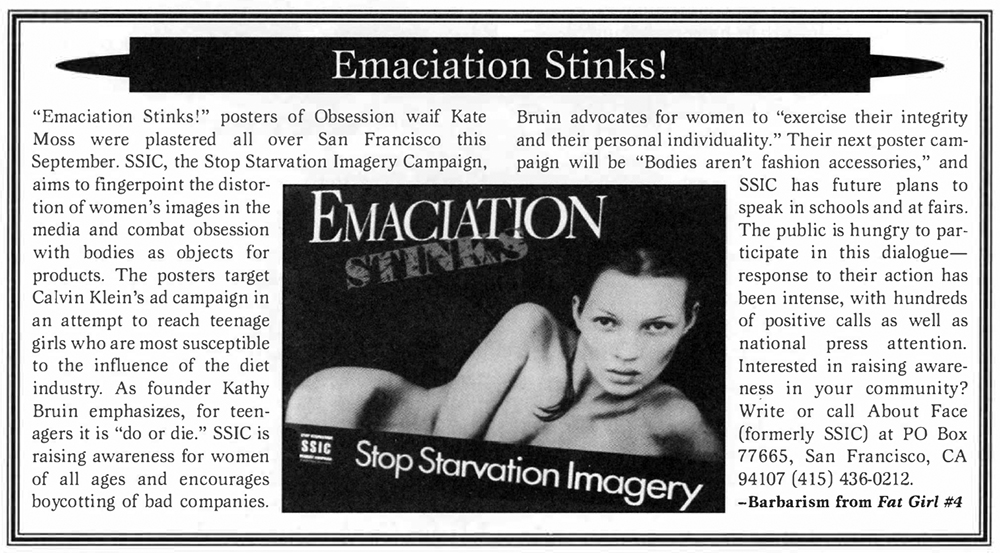
♦ BERTHA: We did a roundtable on this issue, too.
♦ CANDIDA: There’s also the Queerzine Tradition; a lot of them weren’t around for very long and they are sorely missed. For the past 10 years, those publications made a huge difference to us, even though there wasn’t a whole lot of fat presence in them. There’s definitely been a crossover.
♦ BARB: A lot of zines use clip-art imagery. For us, there hasn’t been a lot of fat imagery to reclaim. Usually the images are very white and not very diverse, so I feel there’s a real need for that kind of art.
♦ APRIL: There used to be more images of fat people around, because they were more accepted. However, the people selecting images for clip art CDs aren’t picking those images, so …
♦ MAX: That’s a project: a fat clip art CD-ROM!
♦ SONDRA: I’m working on a history of legal precedents involving fat issues, and it’s tough. Judges are by and large assholes to begin with, and they have stated some horrendously cruel opinions—
♦ BERTHA: —anti-women, racist, prejudiced, fatphobic, anti-semitic …
♦ SONDRA: Although … I found a case dating from 1967 where a woman wasn’t hired as a substitute teacher because she was too fat. The judge (I don’t know where he came from) turned out to be fantastic; he said something like, “Are you kidding? She can do the job. Are you saying that fat people aren’t agile? I know a lot of football coaches who would disagree.” Today, it would be hard to find a judge like this.
♦ V: Are there any Asian women involved in the collective?
♦ MAX: We had an Asian woman involved, but she moved to New York. Oso is Chicano—
♦ MARGO: I’m Latina. However, I just joined …
♦ APRIL: Being racially and ethnically diverse is important to us, and so is having people who are interested in the same things we’re interested in and who want to work on the zine. We wouldn’t turn anybody away! We did a roundtable on racism, and the choice I made was not to be involved in that—because I didn’t want to be the person who had to carry all the antiracist work in the collective. Race, class, culture, weight and size are all really interconnected, and are all topics we will continue to discuss in the zine. They’re a part of everybody’s life. We have by no means said everything there is to be said on these topics!
♦ BARB: In the first Fat Girl, there’s an interview with X (the Asian woman we mentioned) and she talks a lot about the cultural differences of fat.
♦ CANDIDA: There’s a submission by a Filipina for the next issue that also discusses that from the perspective of an Asian-American butch. It’s interesting; she’s well traveled. She talks about weird cultural assumptions
♦ MAX: And being fat and Asian, and what’s expected of her size as an Asian woman.
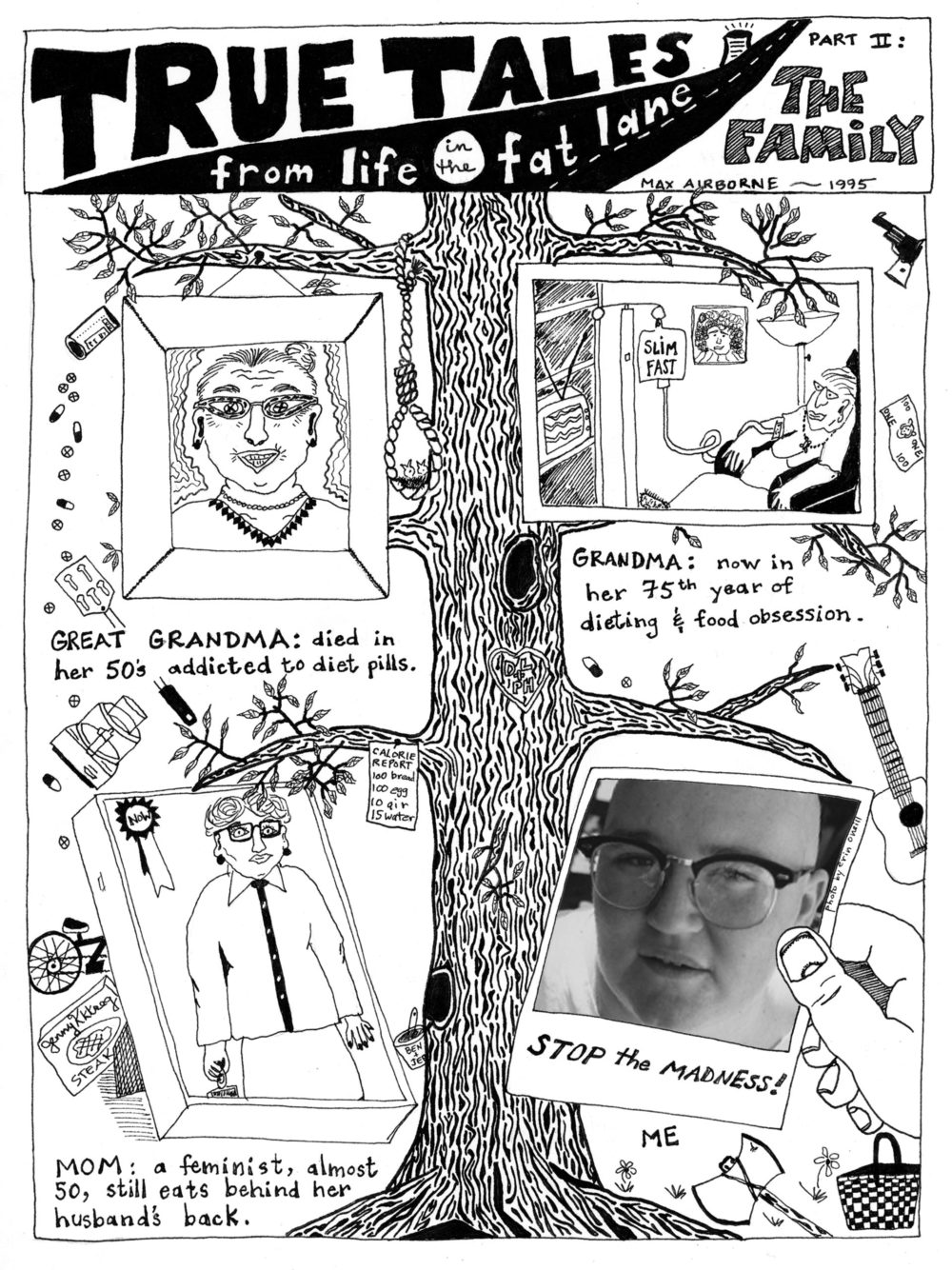
A comic hand drawn with black ink on white paper. A series of frames mixing drawings and handwritten text.
[A banner across the top contains a black, empty road, with a white dotted line separating two lanes, one much narrower than the other. A nuclear power plant is in the distance by the side of the road. Overlaid on this scene are the words, “True Tales from Life in the Fat Lane.” Under the banner is a giant tree with intricately detailed bark, growing straight up, with several branches growing off to each side that each have smaller branches with leaves. At 4 different branches is a portrait.]
1 . [From the top left branch hangs a framed photograph of an old white woman with a bun in her hair, very busy wrinkles around her eyes and mouth. She wears a choker of pearls and cat-eye glasses. Her eyes have crosses in them and she is surrounded by frantic wavy lines. To one side of the frame is a bottle of pills, some capsules and some tablets that resemble her eyes with crosses in them. From the same branch hangs a noose made of twisted rope. Inside the noose is a nest, with two hungry baby birds with open beaks. Below the frame are the words “Great Grandma: died in her 50’s addicted to diet pills.”]
2 . [At the top right branch is a framed photograph of an old white woman in a living room. She sits in a stuffed chair, watching a small television with antennas that stick up in a V shape. The TV screen is just static. The woman wears reading glasses, has prayer beads around her neck, and fuzzy slippers on her feet. The crook of her arm is connected with tape to an IV line, which is connected to an IV bag of “Slim Fast,” which hangs from an IV stand. Beyond her is a floor lamp, and on the wall hangs a photograph of her guru, Satya Sai Baba, who has a big afro. In the air to the side of this frame are a pistol and a $100 bill. Below the fram are the words “Grandma: now in her 75th year of dieting and food obsession.”]
3 . [On the ground below the lowest left branch is a box frame with a photo of a white woman in a business suit, briefcase in hand. On the top of the photo is an award ribbon that says “NOW.” Several objects surround the photo: a spatula, a food processor, some of the pills from great grandma above, a bicycle, a boxed frozen meal of Jenny Kkkreg Steak, and a pint of ice cream with a spoon. On the tree branch is tacked a piece of paper that says “Calorie Report: 100 bread, 100 egg, 10 air, 15 water.” Below this frame is the text: “Mom: a feminist, almost 50, still eats behind her husband’s back.”]
4 . [Under the lower right branch, a large hand comes from outside the page, holding a polaroid photograph of Max, age 29, head shaved clean, wearing old man glasses, looking confidently and softly at the camera. On the bottom of the polaroid it says “Stop the Madness!” On the side it says “photo by Erin O’Neill.” Surrounding this photo are objects: an acoustic guitar, some pills from above, and on the ground some flowers growing, a picnic basket, and a double headed axe. Below the photo is the text: “Me.”]
♦ V: It’s fun to be on a roundtable, like now, but most publishing involves so much solitary work—
♦ BERTHA: I’ve been taking over distribution (which Max did) and sitting at the computer, and then I get on the telephone, and then pack up orders, and then go to the Post Office—it’s amazing how much time it takes to get things done.
♦ BARB: Also, we spend a lot of time dealing with people’s feelings about publishing their photos and their writing—putting themselves out there. It’s very emotionally tiring (as well as being rewarding). There are so many community expectations put upon us; I feel like we always have to be “on,” ready to promote Fat Girl. But that’s not who I am first.
♦ V: Probably everyone in this room has had to deal with being ostracized, and has dealt with a lot of solitude, and now you’re in this great Society of the Future—
♦ MAX: It’s weird! [laughs]
♦ CANDIDA: It definitely grew into a family-like feeling. It was the first time I’d been with a group of people who were dealing with fat activism, and it’s a support system I never had before. I had fat people in my life, and we’d have issues, but never so interpersonally and so regularly. It’s been really great, and interestingly enough, many of us have gained weight in the past year! [everyone laughs] Now I have occasional weird feelings of inadequacy because I don’t weigh 500 pounds! My view of reality has definitely twisted around—identity politics get messed with in an interesting way when you deal with this day after day.
♦ BARB: We still deal with fat-phobia every day, even within ourselves. Some days I wake up and wonder, “How do I just be me, and not a part of this whole collective and not responsible for how everyone else feels about their bodies?”
♦ APRIL: Over the course of doing the zine, I learned that most of us were outsiders and outcasts most of our lives—nerdy or geeky or art-geeks, but always on the fringe. All of a sudden, doing the zine, we’re famous and popular and almost “in.” It’s a very strange experience: being very “fringe” most of your life, and suddenly having people read the zine, and coming up and telling you how much they love you. So this part of the world has changed … but the rest of the world still hates me!
♦ CANDIDA: We got e-mail from a fat woman who attended one of our fundraising events with other fat friends. It was pretty much sold out, and she was in a line waiting to get in, and saw two thin dykes go to the head of the line and chirp, “Oh, there’s room for us,” and get in! Talk about unclear on the concept!
♦ BERTHA: We would have been totally devastated if we’d known about this.
♦ V: We’ve all internalized this society’s concepts and expectations which are hostile to our well being, and it’s so hard to eradicate every trace—this syndrome has been titled “The Enemy Within.”
♦ MAX: I think it’s interesting to see how much people project on you when they don’t know you. They see you in this magazine, you’re talking about something important to them, and they develop this relationship to you—and you don’t even know about it because you’ve never met them! For example, I was exchanging e-mail with a fat activist I’ve never met, and I mentioned that Barb and I were lovers, etc. And she said, “Oh, you can’t break up—you’re the dream couple!” It’s like: we can’t be real people?! We have to become your icons?
♦ CANDIDA: That goes with the territory of being public. No one has contacted us to be on a talk show yet, and I am disappointed.
♦ BARB: We were asked to be on talk shows, but we never quite fit into the topics—
♦ CANDIDA: We never quite fit into the chairs! [laughs] I mean like Geraldo and Oprah and Ricki Lake and even Charles Perez. And it’s not like I’d actually want to do it, but why haven’t they contacted us?
♦ BERTHA: Maybe we should send all the talk shows a copy of Fat Girl.
♦ V: But how would you handle this? Because they’re just set up to devastate you.
♦ MAX: I would bring a gun!
♦ BARB: I just want to be able to say “No!” My fantasy has been for John Waters to contact us and ask us to be in one of his films—that’s my all-time fantasy!
♦ V: That reminds me—these days, I guess there are no more fashion crimes anymore—
♦ APRIL: Fat is often seen as a fashion crime, and we’re trying to break that myth.
♦ LAURA: That’s actually a talk show topic: “You can’t wear that!” Fat women aren’t supposed to wear revealing clothes.
♦ CANDIDA: Laura, will you do a special fashion spread involving horizontal stripes and mini-skirts? [everyone cheers]
♦ MAX: We can all wear white, and wear horizontal stripes!
♦ APRIL: Plus multiple plaid skirts, and floral prints on top.
♦ BERTHA: I used to be a sales rep and wore really bright clothes. I wore an orange jumpsuit once, and this woman came up to me and said, “I really admire you—a woman of your size who’s willing to wear such a bright color and let everybody see you!” I thought, “This is my orange jumpsuit and I love it—is there a problem here? Am I missing something?”
♦ CANDIDA: I was interviewing Jewelle Gomez for Fat Girl #4, and she told a story about meeting a woman in an elevator who didn’t want to wear any kind of perfume that would draw attention to her body in any way. It freaked me out—I completely forgot about when I was younger and thought, “I don’t want anybody to smell anything about me, because fat women smell like—
♦ BERTHA: “Fat women have more body odor—”
♦ CANDIDA: Or, “Fat women smell more like—”
♦ MAX: You mean cunt? [laughs]
♦ V: In your publication, you’re free to include whatever you want. But have you ever censored yourself for being too “out there”? Because your goal is not to merely produce shock value—
♦ CANDIDA: I censor myself from putting too much cattiness in my writing.
♦ APRIL: I think I’m still censoring myself when I write. A lot of my “process” has been working through feelings of “I can’t say that,” “You’re not allowed to say that,” “You’re not allowed to do that.” After I’ve worked through that and am finally able to put something in print—it seems that’s what touches people the most.
♦ BERTHA: April did a piece for “Death on Heels,” which is a production about the “femme” experience. She talked about being a fat dyke in the community, and had the audience in tears.
♦ CANDIDA: Every time I see it in the zine, I still cry. Censorship is an issue with our webzine, because most of the people who see our web page are not our community—they’re jack—off guys looking for thrills, which is what web—surfing is about for a lot of people.
♦ BARB: If someone seeks out the zine in a print form, there’s a certain level of participation you have to go through just to find it—
♦ V: You have to seek out a specialty store; it’s not at your local 7-11—
♦ BARB: And the Internet is so diffuse; it lacks that community exchange.
♦ MAX: Each time someone gets a document from our web site, there’s a record of it. It tells you what document they got, where they came from, what server they’re on, and what they clicked on to get to your page. I can find any place we’re mentioned on the net by looking at our log files, and I can trace when people use keyword searches to get to Fat Girl. We can know that someone searched using “fat bitch” or “naked ladies” to get to Fat Girl. And knowing this completely solidified our decision to totally leave off smut—forget it! That’s not going to reach the people we want.
♦ CANDIDA: All of us feel that what we put in the zine is already incredibly personal. There’s so much easy access on the Net.
♦ V: It takes an exceptional person to mail order—which they should have to do to get your zine.
♦ MAX: Yep.
♦ BARB: Most of the people who drop in on the web are voyeurs, and we’re not going to pander to that—let’s give ’em politics and see what they do with it!
♦ CANDIDA: Most of the people who read the paper zine are voyeurs, too, but we do have an unusually high amount of participation from our readers. The letters we get amount to major dialogue—we really have discussions going on. It’s a shame people have to wait four months for a response. Actually, Max has started a subscription-only e-mail list called fatdykes, which has made possible more immediate discussion, compared with letter-writing.
♦ BARB: People have written that they’ve taken Fat Girl to their discussion groups and said, “This is something I want to talk about, which I wasn’t able to bring up before,” or they’ve read sections to their lovers, or sent portions to their mom. Fat Girl is a real pass-around publication; at least 5 people will read each copy.
♦ V: It’s a magical act to change language, take command of your own imagery, and present a new vision of the world in a context of respect, the way you want your vision to be presented—
♦ BERTHA: It’s kind of a cliche to say this, but I think reading Fat Girl really does empower women. And that’s one of the things I want to see in the world: women empowered, women feeling good about themselves in all areas of life. So that we can take over the world!
♦ MAX: If you believe something, set an example and put it out there for everyone to see and respond to and dialogue about: “Okay, I want to live a life that has no more bullshit. Let’s try getting other people to do that, too! Let’s publish it! Break the chains!”
♦ BARB: That’s what’s so thrilling about the whole zine movement: so many people are trying to incite other people to look at the world with a different eye, and be in the world in a different way.
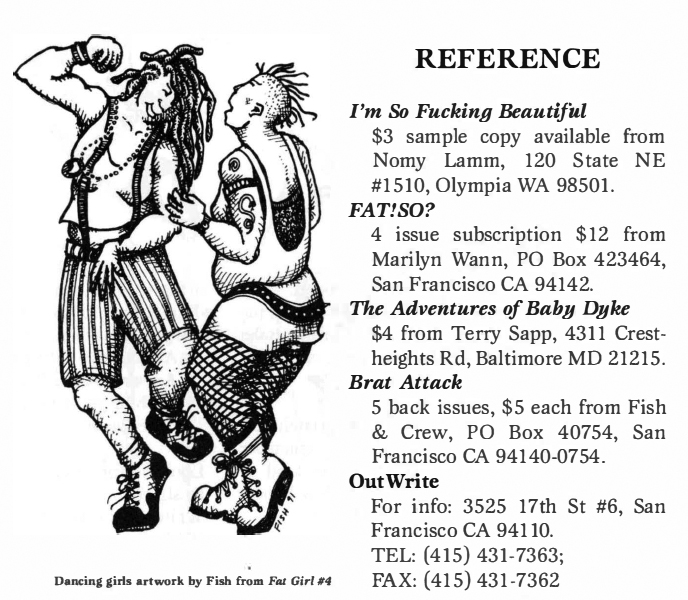
[image: A drawing of two punk dykes, one chubby, one fat, dancing together. By Fish from FaT GiRL #4. And some text:
“REFERENCE:
I’m So Fucking Beautiful $3 sample copy available from Nomy Lamm, Olympia WA 98501.
FAT!SO? 4 issue subscription $12 from Marilyn Wann, San Francisco CA 94142.
The Adventures of Baby Dyke $4 from Terry Sapp, Baltimore MD 21215.
Brat Attack 5 back issues, $5 each from Fish & Crew, San Francisco CA 94140-0754.
OutWrite For info: 3525 17th St #6, San Francisco CA 94110. TEL: (415) 431-7363;”]
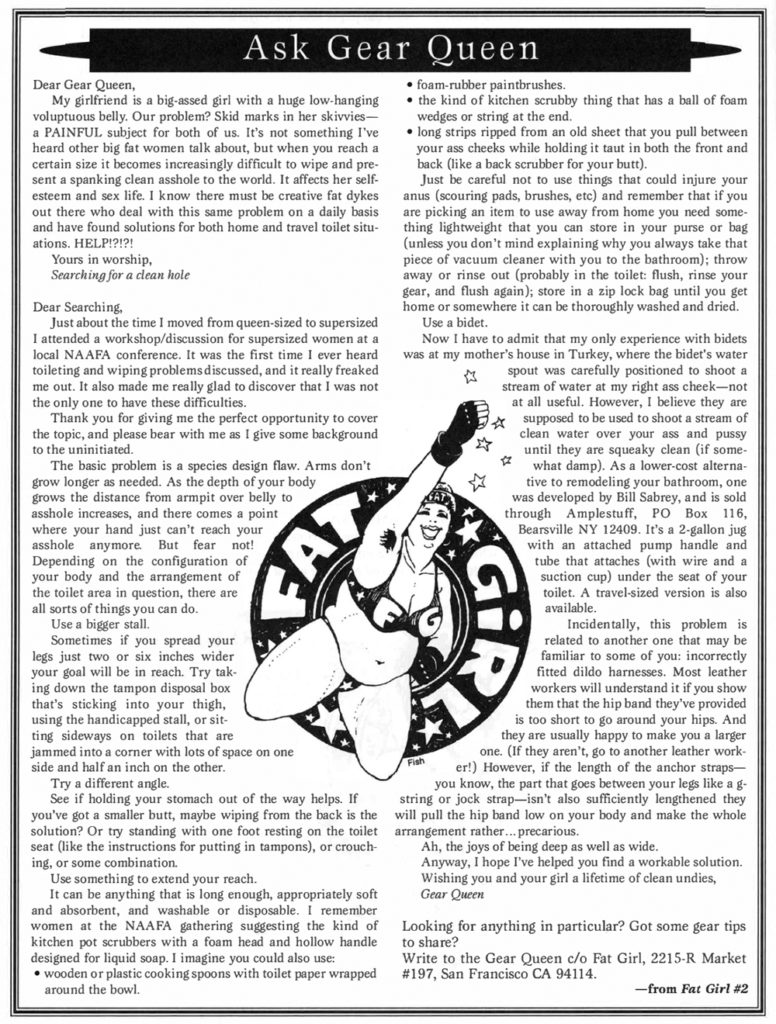
Dear Gear Queen,
My girlfriend is a big-assed girl with a huge low-hanging voluptuous belly. Our problem? Skid marks in her skivvies – a PAINFUL subject for both of us. It’s not something I’ve heard other big fat women talk about, but when you reach a certain size it becomes increasingly difficult to wipe and present a spanking clean asshole to the world. It affects her self esteem and sex life. I know there must be creative fat dykes out there who deal with this same problem on a daily basis
and have found solutions for both home and travel toilet situations.
HELP!?!?!
Yours in worship,
Searching for a clean hole
Dear Searching,
Just about the time I moved from queen-sized to supersized I attended a workshop/discussion for supersized women at a local NAAFA conference. It was the first time I ever heard
toileting and wiping problems discussed, and it really freaked me out. It also made me really glad to discover that I was not the only one to have these difficulties. Thank you for giving me the perfect opportunity to cover the topic, and please bear with me as I give some background
to the uninitiated.
The basic problem is a species design flaw. Arms don’t grow longer as needed. As the depth of your body grows the distance from armpit over belly to asshole increases, and there comes a point where your hand just can’t reach your asshole anymore. But fear not! Depending on the configuration of your body and the arrangement of the toilet area in question, there are all sorts of things you can do. Use a bigger stall. Sometimes if you spread your legs just two or six inches wider your goal will be in reach. Try taking down the tampon disposal box that’s sticking into your thigh, using the handicapped stall, or sitting sideways on toilets that are jammed into a corner with lots of space on one side and half an inch on the other. Try a different angle. See if holding your stomach out of the way helps. If you’ve got a smaller butt, maybe wiping from the back is the solution? Or try standing with one foot resting on the toilet seat (like the instructions for putting in tampons), or crouching, or some combination. Use something to extend your reach. It can be anything that is long enough, appropriately soft and absorbent, and washable or disposable. I remember women at the NAAFA gathering suggesting the kind of kitchen pot scrubbers with a foam head and hollow handle designed for liquid soap. I imagine you could also use:
• wooden or plastic cooking spoons with toilet paper wrapped around the bowl.
• foam-rubber paintbrushes.
• the kind of kitchen scrubby thing that has a ball of foam wedges or string at the end.
• long strips ripped from an old sheet that you pull between your ass cheeks while holding it taut in both the front and back (like a back scrubber for your butt).
Just be careful not to use things that could injure your anus (scouring pads, brushes, etc) and remember that if you are picking an item to use away from home you need something lightweight that you can store in your purse or bag (unless you don’t mind explaining why you always take that piece of vacuum cleaner with you to the bathroom); throw away or rinse out (probably in the toilet: flush, rinse your gear, and flush again); store in a zip lock bag until you get home or somewhere it can be thoroughly washed and dried.
Use a bidet. Now I have to admit that my only experience with bidets was at my mother’s house in Turkey, where the bidet’s water spout was carefully positioned to shoot a stream of water at my right ass cheek-not at all useful. However, I believe they are supposed to be used to shoot a stream of clean water over your ass and pussy until they are squeaky clean (if somewhat damp). As a lower-cost alternative to remodeling your bathroom, one was developed by Bill Sabrey, and is sold through Amplestuff, PO Box 116, Bearsville NY 12409. It’s a 2-gallon jug
with an attached pump handle and tube that attaches (with wire and a suction cup) under the seat of your toilet. A travel-sized version is also available.
Incidentally, this problem is related to another one that may be familiar to some of you: incorrectly fitted dildo harnesses. Most leather workers will understand it if you show them that the hip band they’ve provided is too short to go around your hips. And they are usually happy to make you a larger one. (If they aren’t, go to another leatherworker!) However, if the length of the anchor straps – you know, the part that goes between your legs like a gstring or jock strap – isn’t also sufficiently lengthened they will pull the hip band low on your body and make the whole
arrangement rather … precarious. Ah, the joys of being deep as well as wide. Anyway, I hope I’ve helped you find a workable solution.
Wishing you and your girl a lifetime of clean undies,
Gear Queen
Looking for anything in particular? Got some gear tips to share?
Write to the Gear Queen c/o Fat Girl, 2215-R Market #197, San Francisco CA 94114.
-from Fat Girl #2 “]
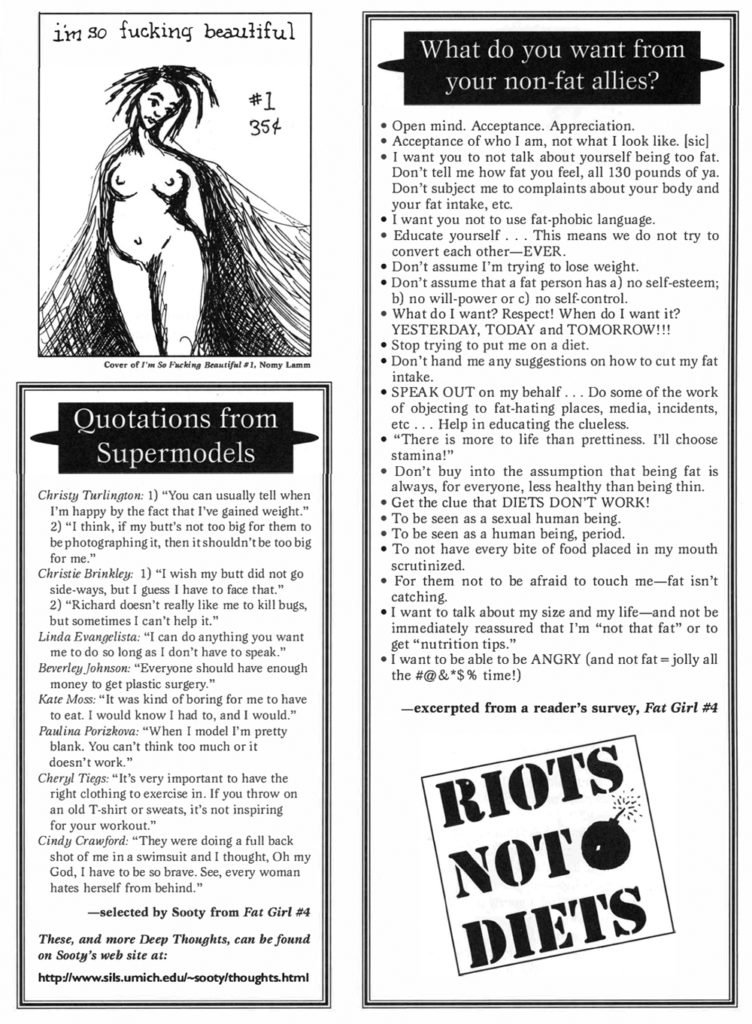
[image description: A text box: Quotations from Supermodels:
Christy Turlington: l) “You can usually tell when I’m happy by the fact that I’ve gained weight.”
2) “I think, if my butt’s not too big for them to be photographing it, then it shouldn’t be too big
for me.”
Christie Brinkley: l) “I wish my butt did not go side-ways, but I guess I have to face that.”
2) “Richard doesn’t really like me to kill bugs, but sometimes I can’t help it.”
Linda Evangelista: “l can do anything you want me to do so long as I don’t have to speak.”
Beverley Johnson: “Everyone should have enough money to get plastic surgery.”
Kate Moss: “It was kind of boring for me to have to eat. I would know I had to, and I would.”
Paulina Porizkova: “When I model I’m pretty blank. You can’t think too much or it doesn’t work.”
Cheryl Tiegs: “It’s very important to have the right clothing to exercise in. If you throw on an old T-shirt or sweats, it’s not inspiring for your workout.”
Cindy Crawford: “They were doing a full back shot of me in a swimsuit and I thought, Oh my
God, I have to be so brave. See, every woman hates herself from behind.”
-selected by Sooty
from Fat Girl #4
These, and more Deep Thoughts, can be found on Sooty’s web site at:
https://www.sils.umich.edu/-sooty/thoughts.html]
[image description: A text box: What do you want from your non-fat allies?
• Open mind. Acceptance. Appreciation.
• Acceptance of who I am, not what I look like. [sic]
• I want you to not talk about yourself being too fat. Don’t tell me how fat you feel, all 130 pounds of ya. Don’t subject me to complaints about your body and your fat intake, etc.
• I want you not to use fat-phobic language.
• Educate yourself . . . This means we do not try to convert each other-EVER.
• Don’t assume I’m trying to lose weight.
• Don’t assume that a fat person has a) no self-esteem b) no will-power or c) no self-control.
• What do I want? Respect! When do I want it? YESTERDAY, TODAY and TOMORROW!!!
• Stop trying to put me on a diet.
• Don’t hand me any suggestions on how to cut my fat intake.
• SPEAK OUT on my behalf … Do some of the work of objecting to fat-hating places, media, incidents, etc … Help in educating the clueless.
• “There is more to life than prettiness. I’ll choose stamina!”
• Don’t buy into the assumption that being fat is always, for everyone, less healthy than being thin.
• Get the clue that DIETS DON’T WORK!
• To be seen as a sexual human being.
• To be seen as a human being, period.
• To not have every bite of food placed in my mouth scrutinized.
• For them not to be afraid to touch me-fat isn’t catching.
• I want to talk about my size and my life-and not be immediately reassured that I’m “not that fat” or to get “nutrition tips.”
• I want to be able to be ANGRY (and not fat = jolly all the#@&*$% time!)
-excerpted from a reader’s survey, Fat Girl #4]
[image description: A sticker with a drawing of a round black bomb and the words “Riots Not Diets”]




